November 2024
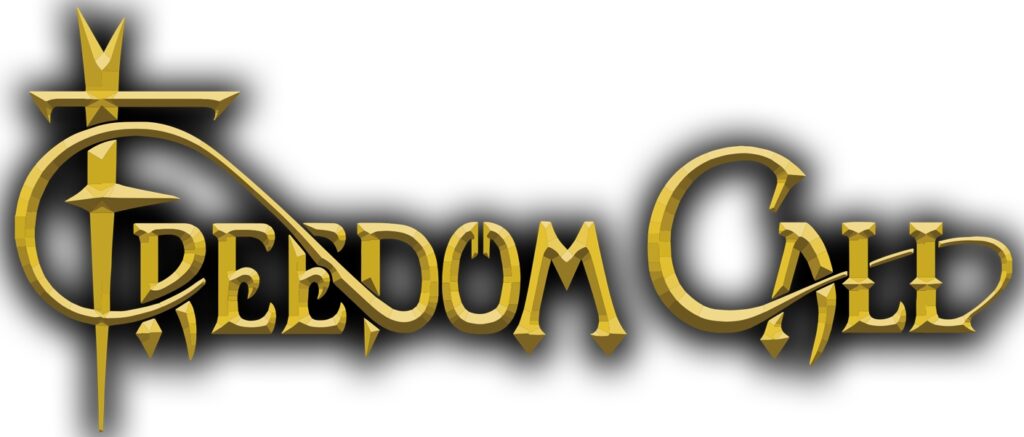
Freedom Call recently visited Stockholm, and Metal Covenant found an opening to speak to guitarist Lars Rettkowitz about the latest album Silver Romance and much more.
Silver Romance was out in May, actually six months ago today, and in what way do you think that that record continues the Freedom Call path?
I think we always try to be authentic with our music and our style, because that defines us. I think we always try to do it exactly like this; to be ourselves, to create the music the fans like, and not doing too much crazy things, like mix up with other styles, or whatever. So I think it’s a good continuation with everything.
Chris usually describes your style as happy metal.
Yeah, I can’t tell where this came from. It just appeared. Chris knows the story maybe, but I just heard it, and I think it fits quite well, because that’s what the people always say, like, “Hey, you’re smiling on stage. You guys are so happy.”, and, “Okay, that’s exactly the message we want to deliver.”.
In the lyrics you use the words warriors, and freedom call, like you have done many times before. I think that’s cool, that you’re sticking to your guns and do what you want to.
Yeah, exactly. Yeah, it’s really hard to not use these kinds of words in this music style. (Laughs) It’s also the thing that those words define our music. In power metal there are warriors, there are dragons, and whatever belongs to the genre. And so you can’t skip them. (Laughs) It’s not possible. I mean, like, we always try to skip those words, to not use that many words like warriors, sword, and whatever, but it’s that genre. You cannot skip it, no.
Although, with that being said, are there any new topics on this album?
Yeah, we tried to have a new topic with the Silver Romance album. I can just tell you how I felt it, you know. For me, it was, like this kind of space travel thing, just like open borders, new worlds. That’s what I tried to put in the lyrics. That’s the whole message. You know, an open world, just feel fine there, and be happy.
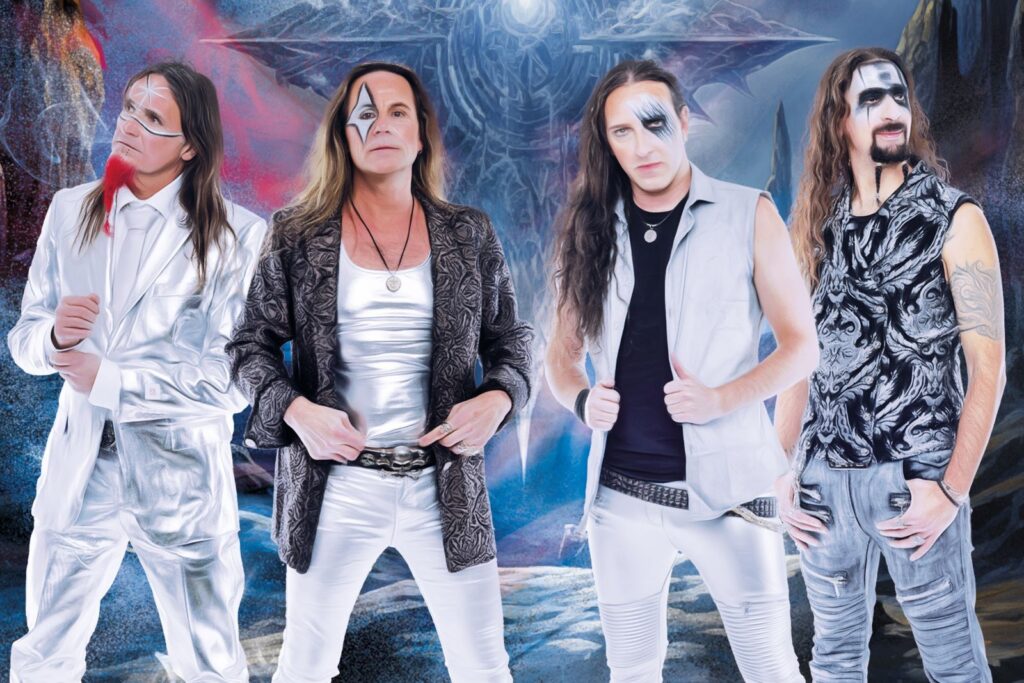
About your guitar playing. Do you personally see a big difference between the time when you joined Freedom Call up until now?
Yeah, absolutely. It was absolutely a development. If you start learning guitar, you have your heroes, so you adopt their style. My first thing was I bought the Iron Maiden – Killers album, and then I suddenly started playing like that. My compositions were like that. Then I was playing in an Iron Maiden cover band. That defines you a lot. Then you have your heroes that you love to listen to, like the Blind Guardian classics, and whatever, but also Pantera I liked, and Sepultura I loved. And this is all a mix of things, but this has nothing to do with Freedom Call. So here is the thing: Chris has a certain style. I had to learn that. And also Daniel Zimmermann, like how he was drumming. You know, when we were writing songs, like thinking of drums back in the day when Daniel still was there, and to learn how they played. It’s 20 years ago, and there is definitely a development. Like, in my songwriting there is more Freedom Call, because I delivered more riffs and, like, the metal thing. But this melodic stuff, that comes during the process of being in the band, you know.
Were you a songwriter when you joined Freedom Call, or did you learn to write songs during your time with Freedom Call?
I did songwriting since I started playing guitar. When I was 13 years old, I had my cassettes there, and I recorded. I had a double tape, and I was singing on it, and I had, like, this little electric drum, and every time I could, I wrote songs. But in a different genre. That’s the thing. You know that I’m a producer as well, so I can help out a lot of bands with my experience that I have from Freedom Call, like songwriting, melody, orchestra stuff. The process of being in Freedom Call since 20 years is super helpful for all, like, metal bands who are new in the business, who just come to the studio, like, “Hey, could you just please check how the violins move? Is it all correct?”, and I can figure out some bucks, and they get maybe more out of it sonically. You know, to give them a better start, and not letting them free to do what they want, and then, “Hm, you failed. I’m sorry. I know why, but I didn’t tell you. Sorry.”. No, I will help. What I learned, I give to others.
So how much time do you in general spend with bands as a producer?
Okay. It’s a complicated question, because there are very different ways of how I produce with people. So, there are people that come to me, like, “Hey, Lars. I wanna have a record in this style.”. So I start composing. Usually, when it’s a style I can do easily, like power metal or so, then I compose songs, and make the orchestra… Like, I have a working flow. Starting with the guitars, bass, drums, programming, then doing the arrangements, and delivering a playback. Sometimes I deliver vocal lines with studio singers. And then they’ll have their song. It takes two days to make, like, a rough mixed, finished demo song. Then sometimes people have their own compositions, and ask me to fill it with an orchestra, with synthesizers, with additional melodies, or make it more interesting. So that’s a different way of how I work, because I already have the guitars. Maybe I have to cut a lot, maybe change a lot, or leave it like it is and just fill it up. And sometimes a band comes to me, and starts recording from scratch, like going to the studio, and it’s all set up, like they know their songs, and they’re a little bit experienced already, and the songs just run through like, you know, how a studio recording goes, with drums, bass, guitars, vocals, whatever. And it takes different time. I really cannot say, like, “Okay, in a week you’ll have your album.”. It can be a week; it can be a year. Sometimes, if you have moments with a super creative output, then you’ll write five songs in a row. But you need 10. And those first five songs you write maybe in a week, but then you need five more, and then it’s five months more, you know. (Laughs)
I guess that’s your main income.
Yeah, sure.
But if you had a shitload of money, would you work as a producer?
Yeah, of course. I love this. It’s passion. Like I told you, I had this double tape thing. It was just record, and playing guitar, and putting the cassette to the next thing, let it go as playback, and then the next cassette. And the quality went so bad after a few, like, takes. Then I was so happy when the first DAWs came out, and I could, like, really work, at home, and not going to a big studio. Because I know the times when I go to big studios, and recording with tape machines, and sometimes you make a mistake, and the tape is expensive for you, or the time is over, or whatever. So that was my starting point to be absolutely interested in that. And so it leveled up. It was more and more and more. Your reputation gets better. Now I’m working worldwide. The cool thing right now is I have a track with Mike Portnoy. I was working as a producer in Los Angeles back in the day, and I still have some cool friends there, and he was calling me. He said like, “I wanna redo this track that you wrote years ago.”. And then they went to the studio of Dave Grohl, the Foo Fighters guy. It was like a powerful ballad, and they redid it. It was Mike Portnoy, two guitar players, and one singer, and I think they’re shooting a video right now. This was also one of my compositions, and I’m really proud of working with this kind of people. When they were at the studio of Dave Grohl, they called me, and I was live in Mike Portnoy’s recording, while he was drumming. As I wrote this song, I layered a lot of drums, and he tried to play it. I mean, he’s awesome as a drummer, you know. And he said, “You know what? I have to do more takes than just one.”. And of course they layered it. And I was there, and I was like, “Yeah, do this. Yeah, it’s cool. I like the groove.”. It was awesome. Like, being there when they’re recording in L.A., from another place, from Berlin.
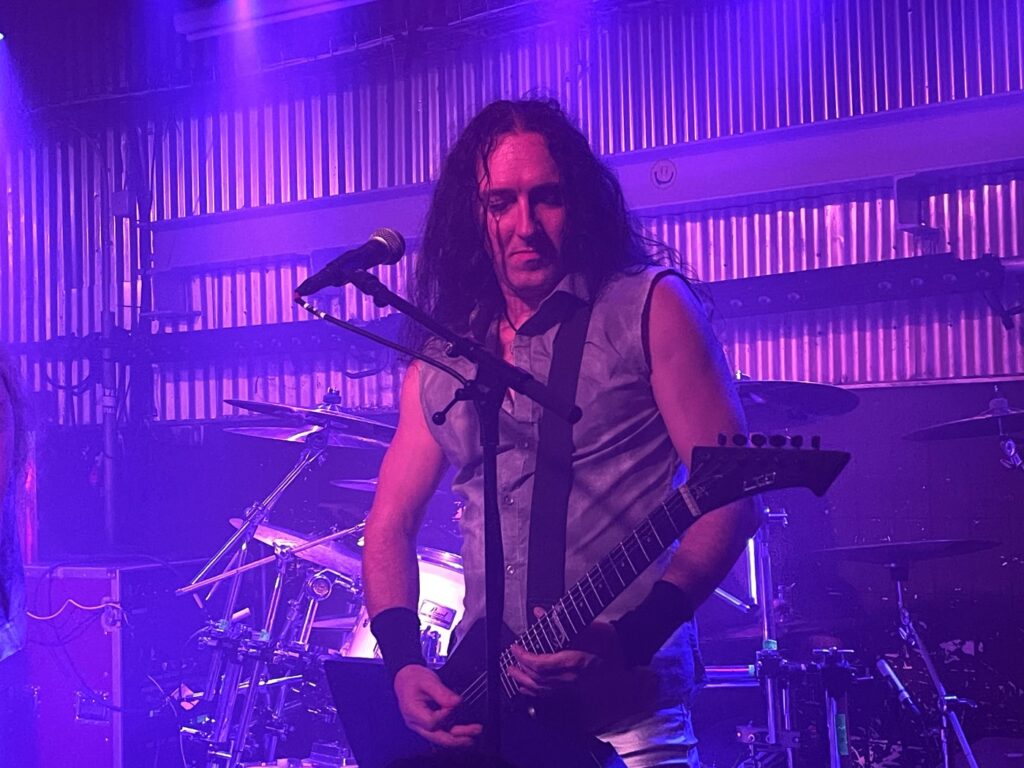
And you mentioned it’s 20 years now. Do people anyway see you as the new guy in Freedom Call sometimes?
Yeah, maybe. I do not know. I can’t tell how the people see me. The strong guys back in the days were Ilker Ersin, Daniel Zimmermann, and Chris Bay. And also Sascha Gerstner, from Helloween. They were, like, the founding members, and it’s always like this: if you come as a second guy, or as a third guy because there also was Cédric Dupont. I was the third, I guess. And you know what? You cannot take their place. You can’t. You will always be the new one. (Laughs) But I think right now with Francesco in the band, I’m like one level higher, because Francesco is newer. You know, that’s why. (Laughs)
At what age did you start playing guitar?
Oh, I think it was quite early. I mean, my parents let me try a lot of musical educations and things. So I started first with accordion. I was really small, really skinny, and this thing was just hurting me, and I couldn’t reach around it with my arms, and I was just crying, and said, “I don’t wanna have this.”. Then my sister would start playing acoustic guitar. That thing was also really huge for me as a small guy. Since the beginning, when I was in class 1, I knew that I wanted to be a musician and a songwriter. And the thing is I was always a huge fan of The Beatles, and I remember that my uncle, my aunt, my mom, my dad, they brought me stuff from The Beatles. Books, cassettes, everything. I had a book where I was drawing them. I really was a huge fan. And I also remember that in the first class photo I ever had, I was choosing my band members, and I marked them with a black pen, like, “You look cool. You can be in my band.”. They had no clue, but that was the beginning of, like, “I want this career. I want this.”.
How much time did you spend with the guitar there in the beginning?
It was crazy. I think my parents gave me my first electric guitar when I was 11 or something. So I was joining the music school before that. There was an ad in the newspaper, because I said like, “Okay. I want to learn guitar.”. My dad was just reading the newspaper, and he said like, “Okay, here is a music school. They offer plectrum guitar.”. I was like, “Hm, it sounds like electric guitar, but plectrum guitar? What the fuck.”. But yeah, they put me in music school, and that was guitar with a plectrum, because we had an acoustic teacher, with fingers, and this other guy was focused on blues, jazz, and stuff, like a really highly educated teacher from the old times. My dad gave me my first electric guitar on my birthday, and I freaked out. And he put an extra space in the cellar for me, and gave me this little amp, to play as loud as I wanted, and to play as long as I wanted. And I played every day, really like 10 hours. I think I had no friends back in the day. And there was one school mate of mine, and it was like how you see it in the movies, because he played drums, and his father had an old garage somewhere. So we put the drums there, and the guitar there, and we started, like, first riffing and composing something. For us, girls came around the corner, “Oh, cool. Those guys are musicians.”. So we got into that, like really the classic thing. And then step by step, like, you meet people, you have your first gig, I joined the school band, and stuff, and so education, different influences from all sides, so that formed me until 20 years of Freedom Call.
When I see you guys in Freedom Call, I don’t see you guys as an ‘80s partying band. You kind of seem like sober guys. Is that the whole truth?
I think, no. (Laughs) I can just talk about myself, so. I’m really the one who’s partying. I love it. I love meeting new people. I’m not the one hiding after the show. Francesco is the same. We meet at the merch or so. And if there is an opportunity, a chance, where we are invited after the show, and we have time, a late buss call or something, we join the people. And we’re not too shy, or think we’re, like, the big guys, like, “Don’t talk to me.”, because I’m always happy. People come to me, and say, “Hey, you know what? There’s this bar around the corner. Your show is done. You wanna join us?”. Like, since a few days we are on tour, and in the beginning, everybody was still loaded with energy, and so we were a little bit louder, a little bit more running around, a little bit more party, and now we’re getting quieter. (Laughs)
Well, my party days are kind of over. You know, I have a regular job, and it’s not worth it in the morning.
If you say it like this, a regular work. Maybe some people just see that, you know, we go on stage, and then whoa, whoa, whoa, and then go out and meet the people, and somebody invites us for a beer. But all the rest they don’t see. The crews, the cables, tons of equipment, and stuff. You know, the weirdest thing is if you’re all on a nightliner tour, the whole day you’re waiting, until the technician plugs things, or maybe load in / load out, or the food arrives. It’s work, even if it doesn’t look like it. I mean, to be fair, we have parties, and we enjoy this a lot. This is a different thing than a day-job. This is a different story, but it sucks energy anyway. We have to focus, we had a lot of education in advance, we went to music school on the side of our regular schools, and just invested a lot. Sometimes people do not see this, what we did to be on stage.
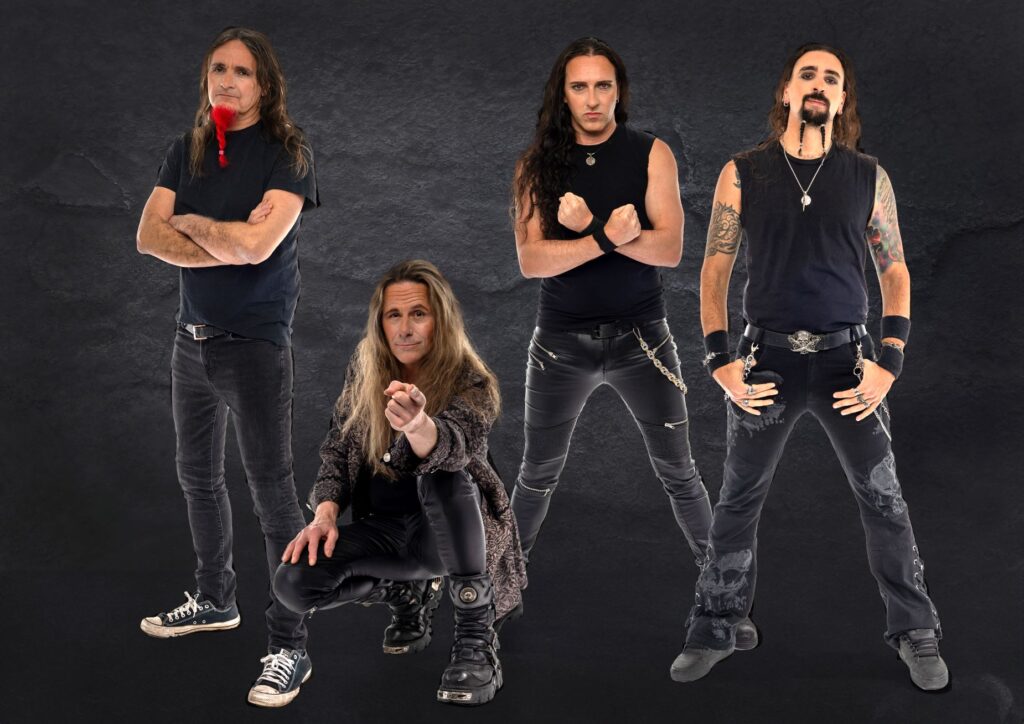
Before the show, after you’re done with your soundcheck, in what way do you prepare yourself usually?
This has also changed over the years. It also depends on the venues, and what opportunities you will have to grab your guitar maybe earlier before the show to warm up your fingers a little bit, especially when you’re, like, in cold countries, or open airs, or something. But I can tell you how it is. We just go on stage. Because you’re so into your routine, and the memory of your muscles is just there, because you do this every day for hours. And sometimes, when it’s really critical, when your fingers are cold, yes, I grab my guitar, but usually no. We’re having a beer cheers, we go on the stage, we play, wonderful. Like, uncomplicated, as far as we can.
And how do you deal with the temperature changes when you’re playing festivals, with the guitar strings and stuff like that?
Sometimes it’s hard. I was playing in a cover band before, and we played every weekend, and the first open airs start around Easter time in April, and they have festivals and fire outside. And if they put you on stage while it’s just like three degrees (Celsius) at night ,and you’re far, far away from the fire, then sometimes it’s really tough. It is hard. I swear. But yeah, you can make it, if you really want to. (Laughs)
Last year, Freedom Call put out a live album, The M.E.T.A.L. Fest. A lot of bands don’t put out live albums anymore. What kind of reaction did you expect from the fans?
Oh, I don’t know. I mean, of course we had this difficult situation with Covid, and part of it was also to bridge something to the Silver Romance album. We didn’t see that coming in 2019. You know, what would happen in the next year. Some songs are from 2020, when we were all, like, in lockdown. We were composing songs already for Silver Romance, like the ballad Blue Giant. It was already existing in late 2019 / beginning of 2020. Then we held back that stuff, because you did not know how the world would change right now, like, “Can we play live again? How long will it take?”. And having the opportunity, it was just a great idea, I guess, to get this kind of adventure for a lot of people at home. I think a lot of people had a lack of live concerts. They had tickets they couldn’t use. The tickets were not valid anymore, because the date was changed, and they couldn’t go to the concerts because they had other appointments instead. It was a mess. So I think this was just to give something to the people that they can enjoy at home and not coming to the show.
I checked out one of your setlists from the other day. It was 10 songs, but not one single song from the two first albums. That’s kind of unusual for bands.
Yeah, we had to strip down the setlist a lot. We have, like, the usual setlist we play, and we have so many songs blacked out, like Freedom Call, and The Quest, and stuff. But it’s just not possible because we have just 50 minutes of playing time here. So, “How to make the fans most happy with the songs we can offer in that short time?”. So it was really like a balancing act, you know. And we can never skip Land Of Light. We can’t do that. They’d kill us. (Laughs)
Maybe not your best song, but it’s probably the most popular song.
The happiest one, yeah. I think also Metal Is For Everyone is skyrocketing. But it’s not that we don’t try to put other songs in the setlist, but we see the reaction from the people. I mean, we had this a lot of times with the song Pharao. People were screaming for that song, and a lot of times that we played it live, the response was just low. And if we play Land Of Light, we see everyone jumping. So maybe the song Pharao is more musical and art creative, but we are not, like, a math metal band, we are Freedom Call. (Laughs)
By Tobbe – Published November 30th, 2024
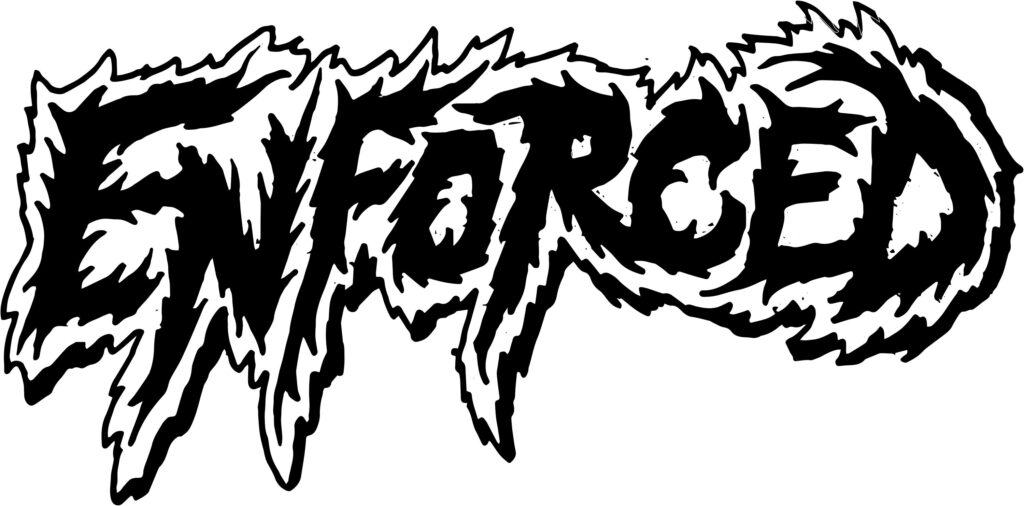
Metal Covenant got some time with thrash/crossover metallers Enforced’s singer Knox Colby when the band came to Sweden on their Euro run with Gatecreeper and 200 Stab Wounds.
For people who haven’t heard you before, describe in best possible way the Enforced sound.
As easy as I can describe it, Enforced is just aggressive music. I’m not really one for labels, and I don’t think anybody else is either. We play fast, heavy, hard music. It’s kind of the end of it. If you like old Sepultura, and if you like Demolition Hammer, imagine a mix of that, and it’s just fast, hard, mean music. And that’s the point, so. That’s as blunt as I could say it, you know,
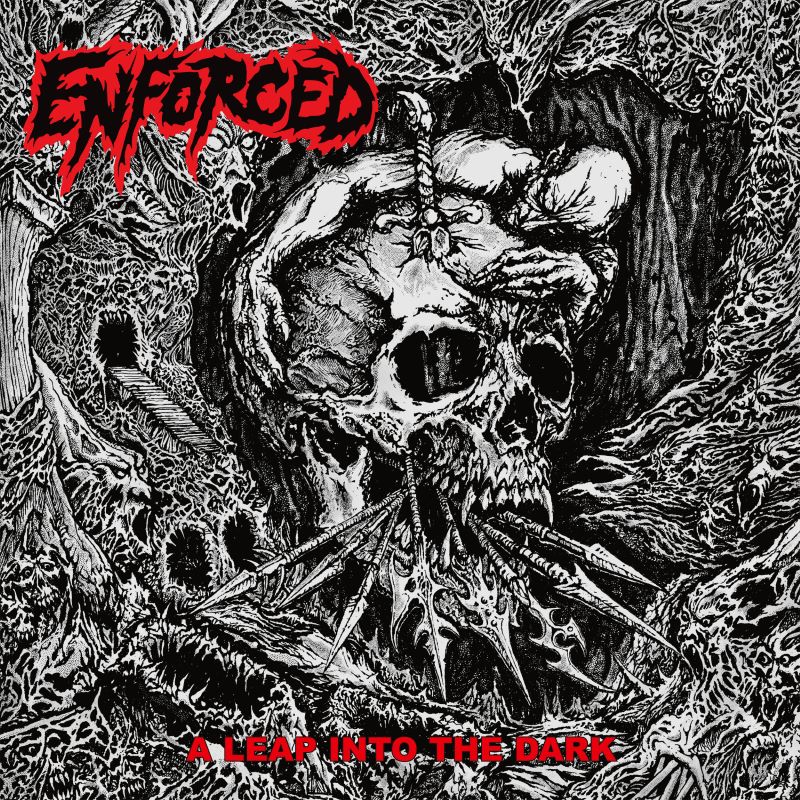
A new six-song EP was just out. Tell me about that EP.
Well, we’re working on out third LP with Century Media, and we have, like, a huge group of songs. Too many, but we also realized that, like, with our tour schedule, and with our own personal lives, that LP wasn’t gonna come out this year. So we were like, “Well, let’s take a handful of those songs, release them, and kind of like lessen the load of the amount of songs that we have for the LP, and still put something out this year, just so we put out something this year, so we can have an LP from 2022 [Kill Grid was actually out in 2021 to be correct.], LP from 2023, EP from 2024, LP from 2025.”. Like, consistent, and every year have something. So, it’s difficult, and that’s probably untenable. (Laughs) But we are all extremely hard workers, in the band and in our own personal lives, so adding that level of severity was just like, “Yeah, it makes sense.”.
You have these new songs, but how come you ended up with having two cover songs on the EP as well?
‘Cause during recording Kill Grid, and recording War Remains, we just kind of had extra time, so we just played around, and just like covered songs. Not thinking that they would ever be anything. So we just had them in our back pocket, and we were just like, “Well, if we wanna put them on the EP, but we don’t wanna put out all the songs, what about we put out, you know, side A is all the new stuff, and side B is just some fun extra stuff, that people might like, or might appreciate?”. So, that was the plan. Just like, “That sounds fun.”. I don’t know if people will actually, like, give a shit about an Obituary cover, or an English Dogs cover. And the shocking part is that, “Yeah, they do.”. Someone from English Dogs reached out to us. They were like, “We love the cover. That’s awesome.”. Like, it’s so sick. We got permission from Obituary, and English Dogs obviously, but we hit Obituary up, like, “Hey. Is it cool if we cover Deadly Intentions for this EP?”, and they were like, “Dude, go for it. We can’t wait to hear it.”. And when it, like, first came out on streaming, they all hit us up, and were like, “Dude, we love it.”. What more endorsement could you get? So when we played with them at Sepulfest, they were like, “We love the cover.”. Like, “Guys. Are you playing the cover?”, and we were like, ”No, of course not.”. (Laughs) Like, that’s so weird. But they loved it, and they’ve always been super supportive of us, and they’ve been really good uncles, in a sense.
And was Casket just too good of a song to leave that out, and have that as a standalone single?
I mean, it never got a proper release. Like, it was on a flexi single for Decibel. And then it got released digitally, but it never had a home anywhere. So it was just like, “Well, you either heard it on streaming, or on a Decibel flexi, and that’s it.”. It needs to be on something, so we were like, “Okay, let’s just get that remixed and remastered to be at the same level with the three other new songs, so it all sounds the same.”. And then it has a home, so. It seemed pretty logical to us.
And the first three songs, are they something that could have been on War Remains as well?
Could have, but wouldn’t have worked. We’re always, like, constantly writing, so we always have like a library of songs, and we are always picking and choosing in stuff for LPs and whatnot. So it always comes down to what fits everything else, like stylistically. And these just kind of… They just don’t. In my opinion they don’t fit. They’re kind of in their own league. Deafening Heartbeats could have, but it feels more correct to have it on this EP, rather than be, like, track 10 on War Remains. And looking back, like, “I don’t wanna think about it anymore.”. That track sequencing was so difficult to do that adding another song, like, “Dude. Fuck it! No way. I don’t want it on there.”. So, it works where it is.
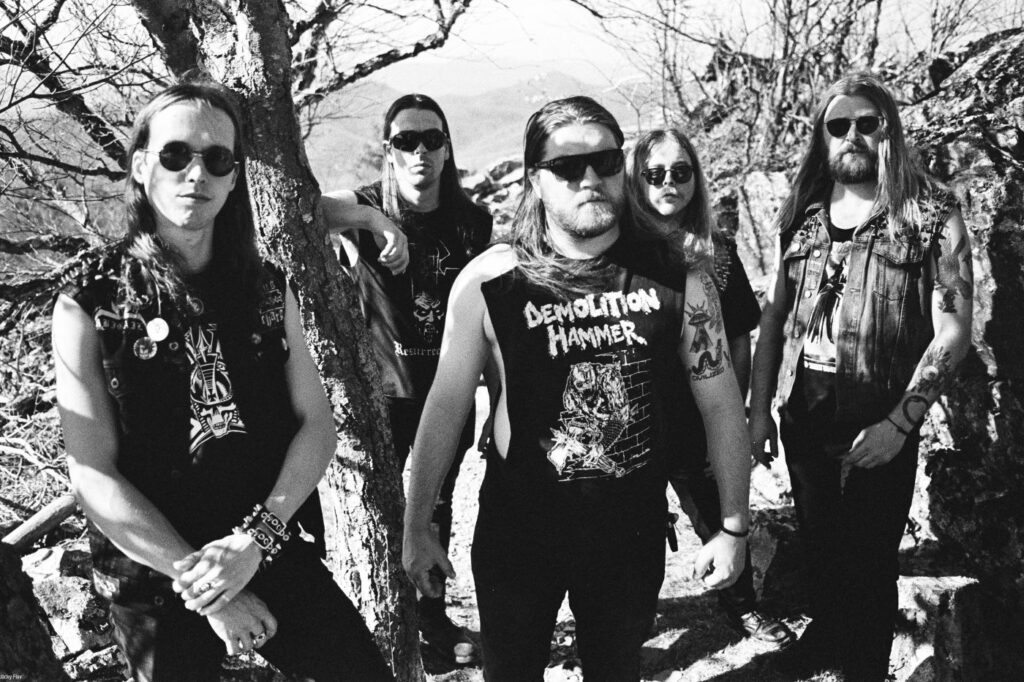
Where did you record these songs? Are you home recording all the stuff, or do you go to a studio?
We go to a studio. So, where we recorded Kill Grid no longer records bands. Where we recorded War Remains got sold and it’s gonna be converted I think into apartments. And where we recorded A Leap Into The Dark is at Minimum Wage studios, in this tiny little neighborhood called Oregon Hill in Richmond, that bands like NO BS! Brass and Avail record at. We had never worked with them before, but as the name implies, you know, it fit the budget. So we were like, “Okay, we’ll just see how that goes.”. And it was great, it was perfect. Like, we knocked it out in two or three days. Like, it wasn’t that big of a deal. And the recording studio was very cool, calm, and comfortable. Like, relaxing and stuff. I think the only thing that, like, became an issue was the microphone. (Laughs) ‘Cause it was mounted on this arm on the wall, and it kept falling on me. But it was a very expensive microphone. So I was like, “Can we just not use this at all?”. It’s in a tiny little booth, so I’m craning my neck, and nothing sounded right. So I was like, “Can we just change this to an SM58, like our stage mic?”. He was like, “Yeah, sure.”. So I was like, “Cool. So I can, like, move?”. He was like, “Yeah, you can do whatever you want.”. So I just did it like I do it live. And after that, we were done. So that’s how I’m gonna do it from now on. (Laughs)
Do you need some kind of ignition to, like, really go for it when you’re singing, like a spark that hits you, or something? Or can you just go when you record stuff?
It’s like a mental spark. I mean, nothing specific I have to do, but it’s just like you just kind of have to get into that headspace of, like, “I might punch someone.”. Like, I’m going to be a persona of myself. Like, “This isn’t truly me, but I’m the vocalist of this band.”. You know, like big hand gestures, like Freddie Mercury. Like, a lot of kicks, and stuff like that. It’s like, “I would never ever do that.”. But when you listen to the music and stuff, it just flows so naturally that, “It’s okay.”. (Laughs) It feels natural to do it then, but then you’re like, “Hoo boy.”, like, “I hope they like that.”. ‘Cause at some points it felt embarrassing. Flamboyant and whatnot. But I love that during the time it feels so right.
What’s with this black and white thing? All your covers are in black and white, I would say, except for…
Except for the new EP.
The logo and the title, yeah. But what’s with this black and white thing, still?
It’s just we come from a very hardcore and punk background, where, like, everything is done super DIY and very cheap. So color costs. So in our head initially, it was just like, “Just keep it cheap.”. Like, you can have a great album cover, and it’d be black and white. It doesn’t need to be, like, this explosion of color, where everything is so distracting. Just have, like, a stark image. And so we did that with At The Walls, and then we were like, “Well, let’s keep that going.”. I sent, like, a two-page manifesto to Joe Petagno for Kill Grid, and he was like, “Okay. I’m gonna get to work on this. However, I usually work in a lot of color, but I think this needs to be in black and white.”, and we were like, “Yeah, yeah. You get it. You get it too.”. And that was Kill Grid, and before we even started recording for War Remains, we were about to start a tour with Obituary, and he e-mailed me, and he was like, “What are you thinking?”. And I was like, “I haven’t even told you that we’re working on an album yet.”. (Laughs) But I was like, “I don’t know, man. We haven’t really discussed it at all.”. He’s like, “Just send me what you got.”. So I was like, ”Well, I’m kind of writing while we’re on tour and everything.”, and he’s like, “Just send it. Just send me everything.”. So it would just be, like, super late at night. I’d be super drunk, and just e-mailing Joe Petagno, like with one eye open. It was, like, crazy shit, and he was like, “More, more. I want more.”. And I think in February of 2022, I woke up in a really shitty hotel, and I got an e-mail from Joe Petagno, and he was like, “It’s done!”. And I opened it up, and I saw, like, this horrific thing. I was like, “Oh, my God. That’s incredible.”. He was like, “You technically drew it.”. I was like, “That’s even worse. God, I need to see a doctor. That’s brutal.”. Also in black and white. It’s all done with, like, a pencil. It’s incredible work. Like, the lack of color adds to how bleak it is. So it doesn’t need it. But we’re dabbling in color now. We’ve got T-shirts that actually have color, for once. And we have a grey shirt. And then the tour shirt has, like, seven colors. And people are loving it. So we’re just like, “Hm, I guess the black and white phase is over.”. Maybe not for the next album, ‘cause we need to, like, finish that trilogy of albums, so to speak. But after that, who knows?
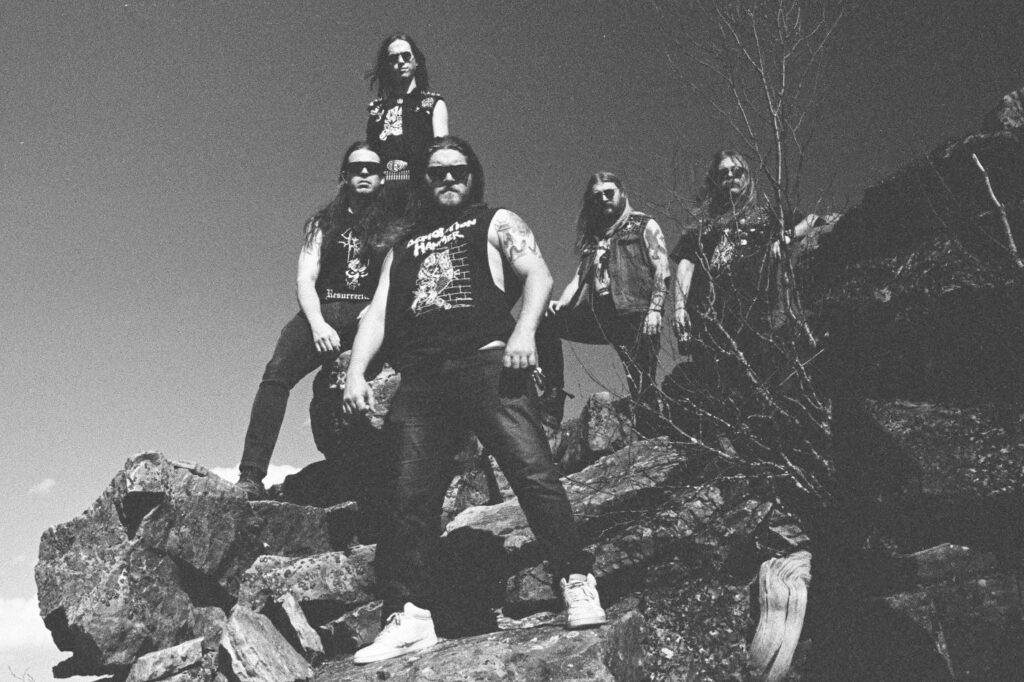
And you put out a video for A Leap Into The Dark. Tell me about that video.
Holy fuck. Fuck that video. So, when we told Century Media that we wanted to put something out this year, they were like, “You wanna put more out? Sure, you can do that, but it’s got to be quick. If you want it out this year, it has to be fast. And you’re going on the Dark Superstition tour, so we need the LP done before you even go. So you got to do it right now.”. And we were going to play Copenhell, and then fly to play two shows in Greece, and we were like, “Well, we’re strapped for time, we’re strapped for cash, we don’t really have an idea for anything.”. But our drummer, Alex, his girlfriend is a graphic designer, and works for a graphic design firm, and one of her co-workers is a fan, and was like, “I’ll do it. I’ll do it for, like, practically nothing.”. We were like, “What’s your…? What are you gonna do?”. He was like, “I don’t know. What do you wanna do?”. So we all met up, and we talked about it. There’s a Metallica song, I can’t remember the video off the top of my head right this second, but it’s mostly just like kind of shifting shots. Like, it’s a lot of editing. It’s like cut. So we wanted to kind of like do our own version of that, but a whole lot of strobes, which we hate. A lot of strobes, a lot of editing, a lot of cutting, so it’s just constantly just chopping you in the face. I personally can’t watch it. Like, I think I’ve watched maybe a minute. Like, I’m good, I’m getting sick. But it was fun to do, in the sense that we had never done something so under pressure before. And it’s, like, the dead heat of Virginia, June, no air conditioning, in an empty warehouse, just constantly playing over and over with just complete total darkness, and then you start playing and then it’s just strobes everywhere, and it’s just someone with a strobe in your face, like in your eyes with a camera, over and over and over again, and we’re all just drenched in sweat, like confused, and just so, like, out of it. Then when we finally got everything, “All right, cool. – Got to go to Copenhell.”, like two days later, so we’re already exhausted. (Laughs) And yeah, then did Copenhell, and then did the two Greece shows, got home. I think we hung out for maybe a couple of days, and then we did the full US tour with Frozen Soul and Creeping Death. So, like, from recording until finishing that tour, that was like one huge chunk of time that lasted, like, three months. By the time we finally got home, in August, we were like, “Fuck, fuck. Oh, my God.”. We were so, like, just bent. Like, it was just like, “Oh, we don’t have anything left.”. So we have a couple of more weeks, then we did a couple of shows with Madball. Down to Florida, and we were like, “Okay. Cool.”. Then we were like, “Oh, now we got to go to Europe.”. It doesn’t end. The unknown never ends, as the song says.
But as long as you keep it going, I think you should be at least a little bit happy about it. Not saying you’re not though.
Yeah, this tour is one of the best ones we’ve ever done. Most of the shows have sold out, and all the crowds have been, like, really good and really receptive. So I can’t be mad. I’m not mad. Like, no one’s mad, no one’s upset, everyone’s having a great time, but it’s just like, you know, you get gassed out at some point. I think we’re getting close to it, but.
You had a different lineup here on stage tonight.
So, our rhythm guitarist, Zach, he left, for personal reasons. We totally, like, love him and support him. There is no ill blood, or anything bad. Like, we’re all still friends. But he’s gonna take care of some things he needs to take care of. With the amount of touring that we have been doing, all of those problems were being ignored, and he just kind of came to just hate being in the band, ‘cause he needs to focus on those things. And so he finally just snapped it. (Snaps his fingers) It was just like, “I can’t be in this band anymore.”. But at the same time, I mean, he also said, like, “I’ve done everything I ever wanted to do in a band with this band. I can’t be in it anymore. I’m satisfied. So god luck and good speed. But I’m done.”. And after, like, talking it out, and, you know, figuring out, everybody was just like, “That’s fine. You’re fine. You’re okay.”. There’s no bad blood, so. I love him and I respect him.
And who did replace him?
So right now we have the young stud Jimmy Frost, who is from Washington, D.C.. He plays in the band Desolus. He plays fast as fuck, and that’s what we need. And our full-time new guitarist is Josh Francisco. They both have cool names. Josh Francisco is in two other bands. One is BloodRitual, out of North Carolina, and the other is Blazing Tomb. Our merch guy is the vocalist of Blazing Tomb. So we keep it pretty incestuous. (Laughs) But, you know, Josh was happy to come on. I thought it was very noble of him to be like, “I’d love to do it, but I have to ask my wife first.”, and his wife was like, “You’d be a fool not to.”, and he was like, “Okay. My wife says yes.”. So I think the LP might get stalled a little bit ‘cause I think Josh has his own ideas. So we’ll see how it goes. He’s filled in for Zach before, when we toured with Venom. Josh plays guitar, and so we toured with him, we played with him, we vibe with him, and we connect really well, and he’s a good friend, so I don’t see an issue. Like, it’s gonna be great. So I’m excited to see what the difference will be. ‘Cause it will be different, yeah.
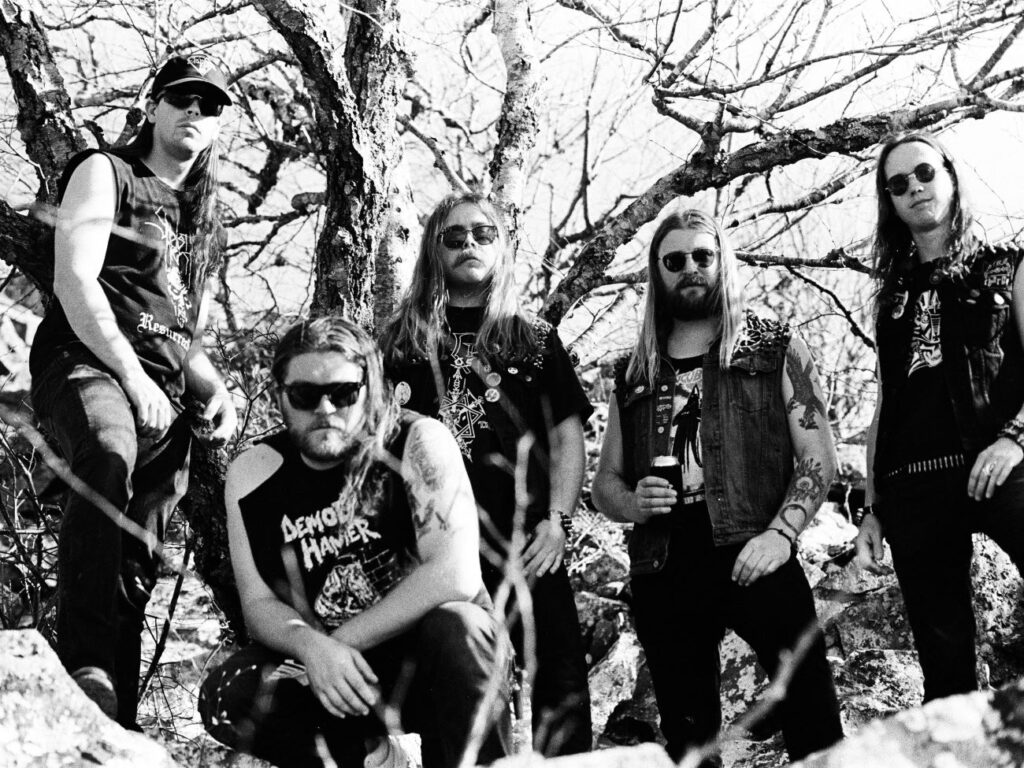
What got you into this kind of music in the first place?
Oh, man. This is a very specific answer. I grew up in Minnesota, and there is not a lot going on in Minnesota, and they like it that way. But Dee Snider from Twisted Sister had a syndicated radio show where he would play traditional heavy metal, hair metal, and whatnot. My brother and I were obsessed with it, and so whenever we got in, you know, like the family car we were like, “Put on…”. I can’t remember the signal. So we were just constantly listening to Sabbath, and Metallica, and Megadeth, and stuff like that, and then Korn, and Kid Rock, and Marilyn Manson, and Limp Bizkit at the time, as they were all, like, you know, coming out. My brother had this big boom box that you could record cassettes with. So he would turn the radio on, and put in a two-hour tape, and record the whole show, and then we get home and listen to it. You know, we listened to everything. Anything that he played, we’d listen to. So it slowly was just kind of stuck in our heads from a very early age. And once we moved from Minnesota to Fredericksburg, Virginia, we felt like super isolated, ‘cause we knew no one. We lost all of our friends. We were, like, 10. We were only gonna be there for two years, so, “why even get to know anybody” kind of thing. And it’s a very weird situation to be in when you’re, like, developing. So we got into punk, ‘cause punk was just like, “I don’t fucking need you.”. So we started listening to Ramones, started listening to Clash, started listening to Casualties. Like, any type of punk. And then, when we moved to Chesapeake, Virginia, that’s when we got into hardcore, because there was a hardcore scene in that area. So then we just went full hog into hardcore, from age 12 until 34. So it’s been a lifelong thing. Like, it never really stopped, you know. In comparison to everybody else, I’m unique in that. It’s just like I’ve always been this angsty, like, shithead, that needs to yell at people. So I do, so I do. And the fact it’s working out in a positive way is great. Like, that’s shocking. This shouldn’t happen. It’s very nice though.
By Tobbe – Published November 25th, 2024
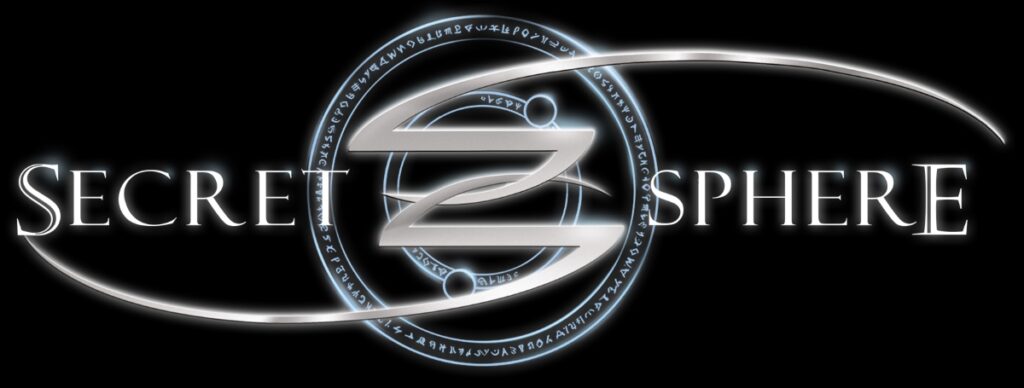
Italian power metallers Secret Sphere recently played in Stockholm, and as the band’s guitarist Aldo Lonobile is a man of many tasks, with a hand on quite a few other projects on the side of his main band chore, Metal Covenant took the chance to ask about the new Sunstorm release and what is going on in some of the other bands on his desk.
What’s most difficult with taking 10 studio albums and narrow it down to a set of 30 minutes and six songs?
I mean, the story of Secret Sphere begins, you know, 26 years ago, and until 2005, I would say, actually we were much more popular than now. We had the chance to have a couple of albums. Especially one is still an iconic album for the Italian power metal scene, you know. A Time Never Come is recognized as an iconic album for the Italian power metal scene. After that album, we got signed by Nuclear Blast, and we did several tours. I mean, with many big artists as well. Then, let’s say, I decided to be more focused on my personal career, so I built up my name as a producer and as a session player. I continued to release albums with Secret Sphere, but to be honest, I didn’t give the band the time that the band deserved. And this brought, you know, the whole band to a difficult situation because it was very difficult, you know, to bring back basically what we had in the past. You know, Roberto, the current singer, left, and then Michele Luppi from Whitesnake joined the band, and that was the beginning of a very nice period of time as well because we did a headliner tour. But then, you know, we stopped again. Now Roberto has come back, and we did two really good albums. You know, well-received by the media. And now it’s time to rebuild the stuff, okay? And this is, you know, a sort of new beginning. And the good thing is that, you know, we are doing the tour with two bands of friends, because we know Freedom Call, I believe since 14 years, or something like that, because we already did a tour together, with Gamma Ray back in 2010. And I know Rhapsody Of Fire since many, many years, because we are both Italian. And, you know, even if it’s 30-35 minutes, we are getting an audience, we receive pretty positive comments, people buy the merchandise and the album, and, you know, it’s a way to start to move again. So, I see this as a new beginning. Let’s say it like that. So it’s totally fine.
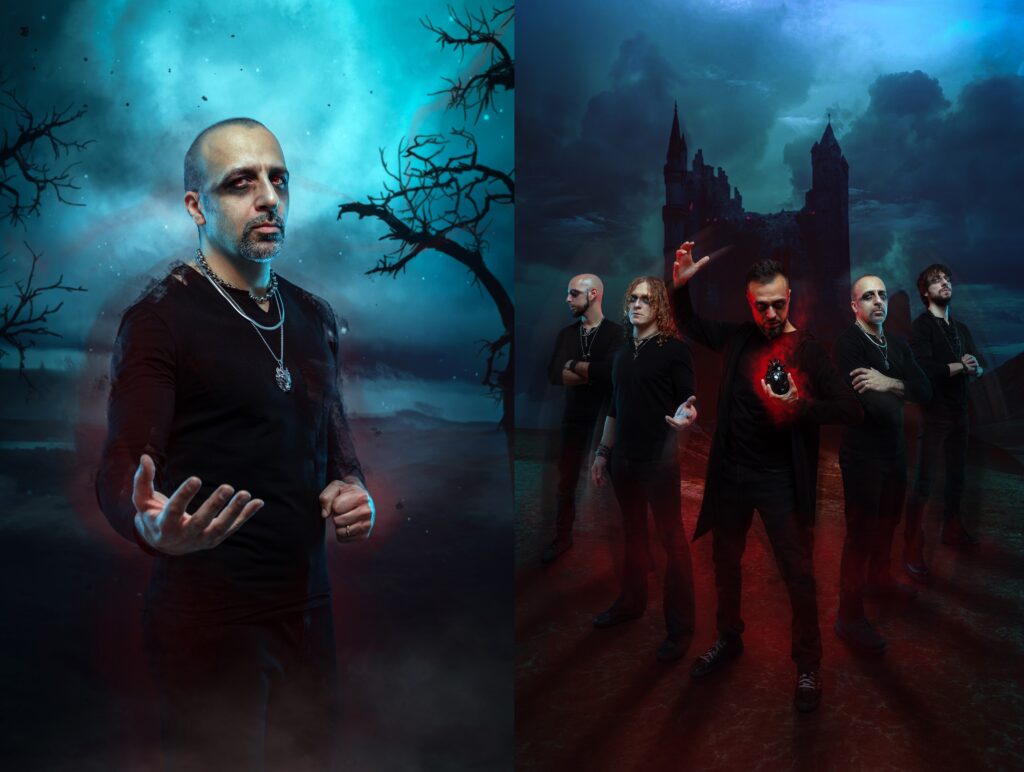
Exactly one year ago today, Blackened Heartbeat was out. What can you say about that record now after a year has passed? And it’s probably been almost 1,5 or 2 years since you recorded it.
I’m still very, very happy of the album. I see Blackened Heartbeat as Secret Sphere in a new dress, because it’s much heavier, much darker, and that is the road that we want to go. We want to be even heavier, and dark with the orchestra. To be honest, I don’t recognize myself anymore as a classical power metal band, because we did tons and tons of that, and I want to give more space to my extreme influences. I have tons of extreme influences.
Even though you said that the Secret Sphere was, like, a second choice for you for some time, the band has put out albums almost every second year anyway. So, will we see a new record coming out in 2025?
I think in 2026. I mean, in 2025 we will be out on the market, because we are going to re-release almost all the albums that we did in the past, with new artwork. We are going to re-release Archetype remixed, we are going to release A Time Never Come on vinyl, we are going to re-release Sweet Blood Theory with new art. There will be six releases for Secret Sphere in 2025, and in 2026 a new album will be out. I mean, I would like to have the band more active now.
And how will you get the fans onboard?
It’s a challenge. Touring is an important aspect, and festivals, and we also have to embrace social media, in the modern way, because it’s, you know, very, very important that we do that today. In these days it’s totally different. When we came out, there were no social media. It was just about the magazine and word of mouth. So now it’s different. You know, it’s good and bad. You know, I see both faces of the medal.
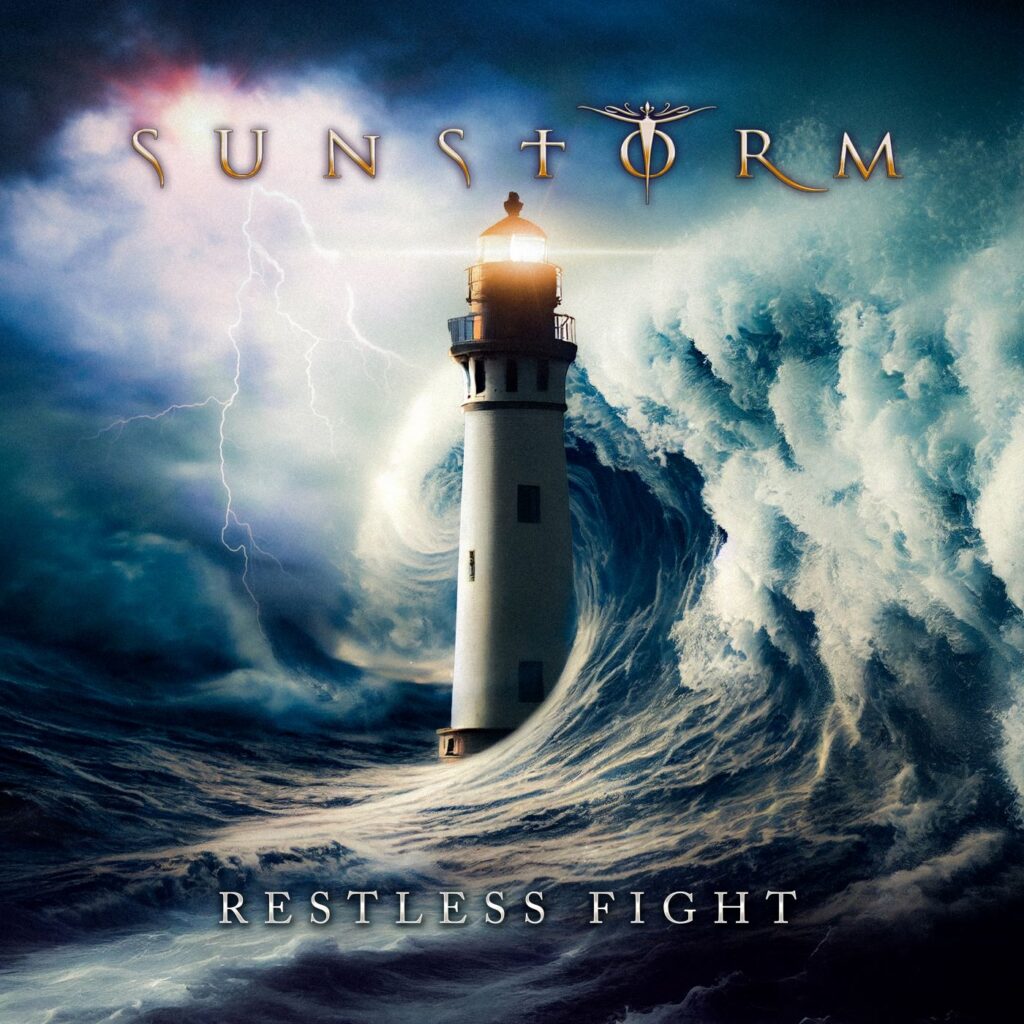
Let’s move on to Sunstorm. A new record, Restless Fight, is out on November 22nd. What can you tell me about that record?
It’s a strange story, because, you know, I have been asked to step in as a producer and guitar player. Well, at the beginning, it was supposed to be just as the producer, because the opinion of the label was that the project needed, you know, a new production team, just to give it a little bit more a different way and different production, and, you know, to renew the stuff. And then I spoke with Ronnie, and we got along very well together, and also the label said, “Play the guitar as well.”. My roots, my background, it’s not really AOR. It’s totally different. I mean, I can play hard rock stuff, but more in the Dokken way, you know. The new album is much more guitar oriented than the previous stuff, and there are less keyboards. It’s always hard rock, melodic. It has, you know, in some way the AOR vibes, but it’s much more guitar oriented. But ‘til now, the reactions are very, very good actually. I was a little bit worried, because it’s a longtime project that the label has, and when you change it a little bit… Actually, this is the third change that Sunstorm has, you know. First with Joe Lynn Turner, then Ronnie stepped in, and now I completely changed the lineup beside Ronnie. So it was very strange, but I bring together some great musicians. Nik (Mazzucconi) from Labÿrinth, Alfonso from Temperance. I believe that the lineup is strong, and Ronnie is an amazing singer. There are some people that say, “It’s great music, but it’s not Sunstorm.”, but honestly, I don’t care, you know. It’s important that the music lives, and the reactions are very, very good at the moment, so I’m very happy. But, you know, if I have to be honest. If you listen to the previous Sunstorm, there is more or less the same vibe on album after album. I kept some old songwriting. You know, it’s not completely new. I kept some stuff. But if you listen to the demo and the final production, it’s completely different. I completely changed the guitars, and Ronnie did it his own way. We did different vocals, because in the past Ronnie used to sing just the main line, and then other people did the backing vocals, but now it’s all Ronnie. I mean, he’s such an amazing singer. It’s totally his job. It doesn’t make any sense to me to have someone else singing in the chorus.
Was it just as easy for you to write that a little bit more melodic stuff than to write power metal stuff?
Yes. I mean, as I said, my roots are not AOR, but I have tons of hard rock background, but more into, as I said, Dokken stuff, and Ozzy stuff, and more from the guitar heroes, like, you know, Mr. Big, Extreme, stuff like that. I just took that part of my influences, you know. And when you play hard rock you have more freedom than in power metal, if I’m allowed to say that, because when you play power metal you stay to fast tempo, shredding stuff, orchestra, choruses, blah, blah. With hard rock you can use the guitar in a different way, so it’s good to have the chance to use the guitar in a different way.
Will we get to see any live performances from the band?
We discussed that with Ronnie, and, you know, maybe with the next album, if there will be a proper plan, because his schedule is very busy, and my schedule is very busy. But if we plan a year in advance, it might be possible. Even, you know, five or six shows. But I think it will be possible. I wouldn’t be surprised.
I guess a couple of festivals have already wanted you to play there.
Yes. Some sent us some messages like, “Hey. Do you want to join the festival?”. But it’s no. For 2025 it won’t be possible. But 2026 maybe.
Will it be hard then to pick songs to play live? Will you pick Ronnie’s songs, or songs from the new album, or pick older songs as well?
Yes. You know, I mean, there are many good songs on the previous albums, so maybe we have to do a best of. Even stuff from the Joe Lynn Turner era in the beginning. There are some songs there that are really, really great, you know. So we’ll just have to pick up the stuff and make a best of of it.
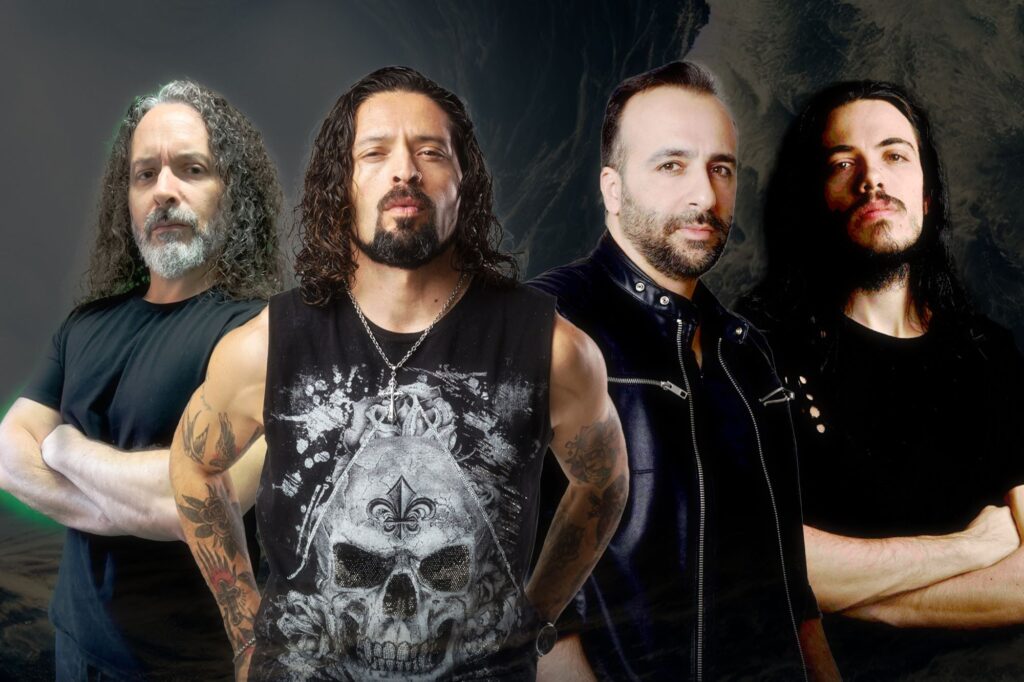
You play with a lot of bands now on Frontiers Records. Are you on their payroll? I mean, are you on a monthly salary from Frontiers now?
I mean, I’m handling the A&R for Europe for Frontiers. I do several productions for them, but you won’t see me play, you know, in the albums. That’s something that I won’t do. I will be happy to produce stuff. For instance, I just finished to produce the new Robin McAuley album, but I don’t play there. You know, I’m the producer. You know, it was even possible for me to play guitars there, but I don’t want to have my name as a musician in every album that I do. I won’t do that, because to me it doesn’t make sense. I prefer to stay as a producer, and I don’t like to be the usual suspect, like force me to play on every record. I prefer to give space to other musicians. In the Robin McAuley album there are a couple of guitar players that are very good and deserve attention. But I think I play the beginning of one song, but just because, you know, when I was producing the album, I had a feeling that the intro was missing something, and then I took the guitar, and I played the intro. But that’s just because it’s a sort of arrangement. Also, I produce the new Venus 5 album, and I don’t play nothing there. And the second album of The Erinyes, which is another production, and I don’t play nothing there. You know, you will see my name as a producer probably every three months. (Laughs) But not as a musician. I won’t do that. For me it would be a mistake. Production is one thing, but to keep on having your face in every album, that’s not for me.
So you are not the new Del Vecchio?
No. Ale is one of my best friends. But, you know, we have different ways. He was happy, you know, to play in so many albums. I mean, he’s a great player, right? So, it’s just a different way to handle the production. For me it’s time to be a songwriter and a producer. And just keep the production where I began as a player, like there is Sweet Oblivion with Geoff Tate, or Archon Angel with Zachary Stevens, and Sunstorm, but not the others.
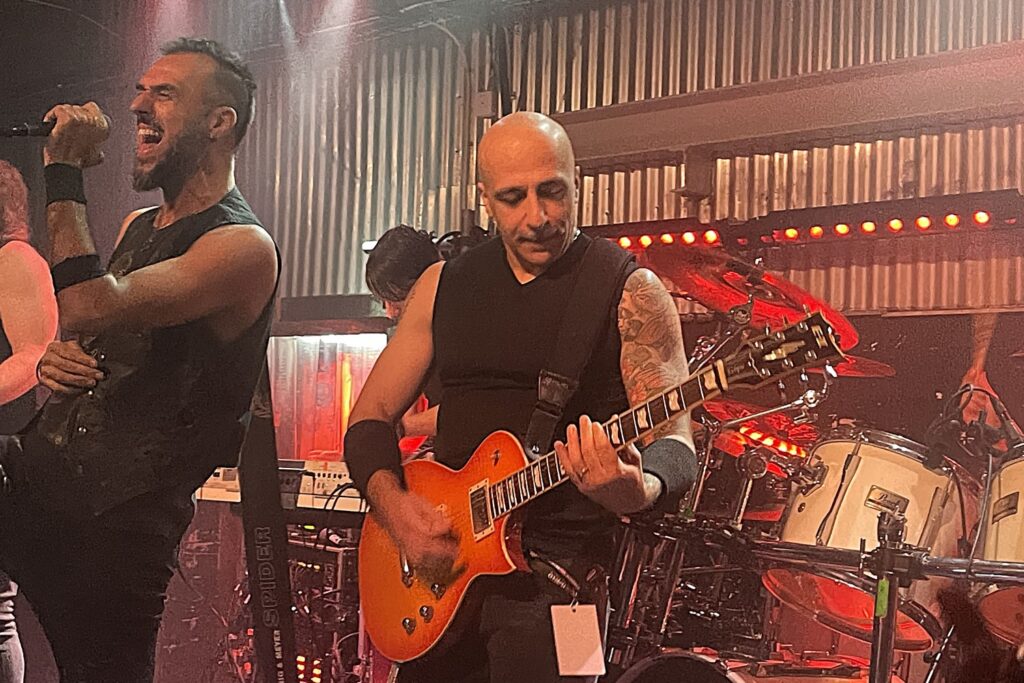
There are more band names that I can mention. Black Eye. What’s happening in that band now?
Yeah, Black Eye was more of a standalone album. David (Readman) is with Voodoo Circle again, and in other projects. He has also his solo career. And that album was supposed to happen many years ago, and not with me, but with other producers. But David didn’t get along very well with the old producer, and then I stepped in, you know, to make the album. But it’s just standalone stuff.
Edge Of Forever. Another band that you’ve been involved with in the last few years.
Well, Edge Of Forever is actually Alessandro Del Vecchio, you know. We did three albums together. Three great albums together. There are, you know, some work cooking. But to be honest, I don’t know what the plan is there.
And another band. Lunarian.
It’s another standalone album. With an amazing singer, because Ailyn is a fantastic singer. But it’s just, you know, isolated stuff.
Ring Of Fire.
Unfortunately, you know, Vitalij Kuprij passed, and that’s why you won’t see any more of Ring Of Fire. It was more the work of Mark Boals and Vitalij, and I was very happy, you know, because previous to me there was Tony MacAlpine playing the guitars. But, you know, Vitalij passed in the beginning of this year. You won’t see Ring Of Fire, at the moment, at least.
And let’s go back to Archon Angel. What’s happening there at the moment?
I’m going to deliver the songs to Zak, I believe in December. He has time to record until March, because then the Savatage tour starts. But there will be the third chapter.
And let’s also go back to Sweet Oblivion.
We are finalizing the mixing with Geoff. I miss some vocals in some songs, but the third album is basically already recorded. And it’s much more Queensrÿche than the previous stuff.
By Tobbe – Published November 17th, 2024
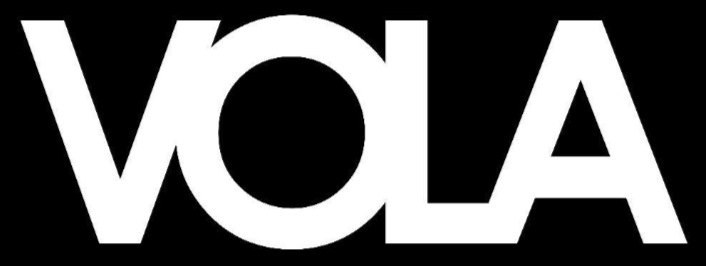
The to three fourths Danish outfit Vola is currently on tour, and as the band played in Stockholm, exactly one week after the album Friend Of A Phantom was out, Metal Covenant seized the opportunity to talk with the band’s Swedish drummer Adam Janzi.
Your new record, Friend Of A Phantom, was just out, and tell me, like briefly, about this new record. Just anything that comes to your mind, really.
Yeah, Friend Of A Phantom, our fourth album. It’s one that I kind of feel a bit more personally for. We recorded it in Denmark, with Jacob Hansen, the drums, at least. We had to do two sessions ‘cause the first time we went there, we had, like, just half of the album done. We had to book another studio session to finish the other half. When we were there for the second session, there were still songs that weren’t finished, so one of the songs we had to finish in the studio. So it has been a different kind of process this time. We have, you know, fallen behind. We’ve been lagging behind a bit. Not because we have had struggles writing it, but just because of the pandemic and the general mood that has come from the pandemic. That has kind of influenced the album a bit, I think, subconsciously. But it definitely influenced the process, ‘cause, you know, during the pandemic, you don’t know what year it is, you don’t know what time has passed, so it has felt very short and very long at the same time, and that in turn affected the album process.
And your last album, Witness, was released actually during the pandemic, and pretty much recorded during the pandemic too. Was it kind of a different feeling anyway to go into this new album knowing that the pandemic is kind of over? Well, it’s over in general, but not entirely over yet, that is.
The Witness album, you know, was written before the pandemic, but when it came out it was in the middle of the pandemic. Then we knew, like, “We cannot tour with this album.”. So the album itself had this kind of open feeling, and these open motions that we all had before everything went down, but then the release was impacted by the pandemic, while this new album, Friend Of A Phantom, the writing itself was impacted by what happened during the pandemic. So now, releasing it, and being able to tour with it, you know, that wasn’t the case with Witness, feels pretty good. And the fact that the pandemic has impacted the sound is not necessarily negative. It’s just like that’s just the stamp on it, and it’s just a sign of the times, pretty much.
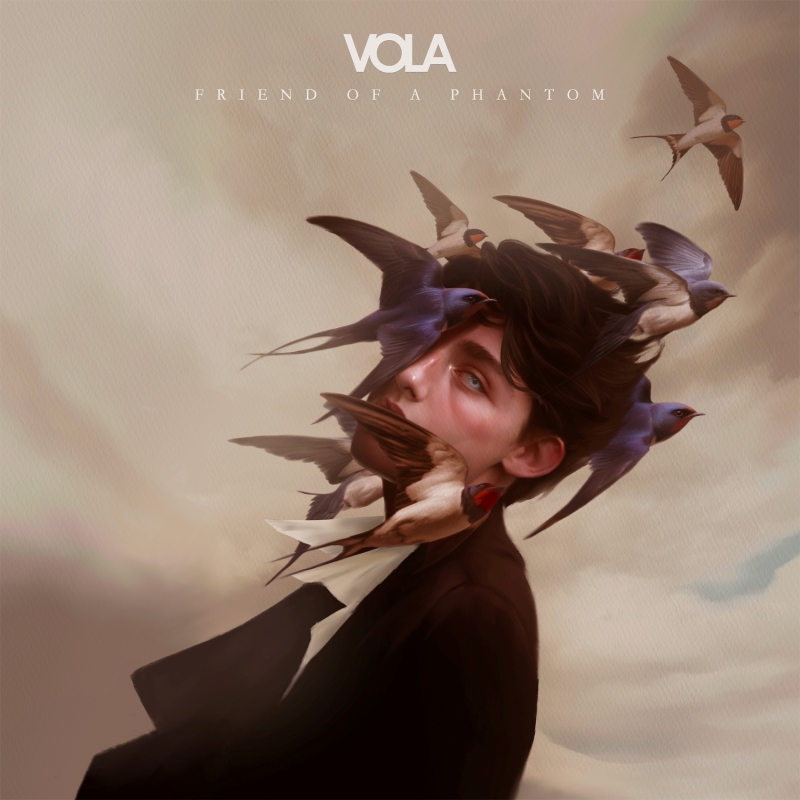
And you mentioned Jacob Hansen. What may an experienced guy like him do for the overall sound on a Vola record?
He shapes it in fantastic ways. He’s so cool, and such a nice person also. Really, really nice. The way he works with our sound is fantastic. Couldn’t have wished for a better engineer for that. I actually went to his place to record a drum sample pack myself. So, we have worked together and have become friends also through this. So it’s really been fantastic. On Witness he mixed and mastered it. We didn’t really get to meet. We recorded the drums in Gothenburg with Jakob Herrmann, but now we actually went to Jacob Hansen and recorded there. So yeah, more intimate. Yeah, he is a good friend.
You say that you’re being in a studio. A lot of bands have home recorded stuff nowadays. How much did you record at your own places?
So the drums were recorded at Jacob Hansen’s place. He has a fantastic drum room. Great microphones, great way to capture everything. So that felt right. But then the vocals, guitars, bass, keys, everything, even percussion, were recorded actually at home. Most of it at our singer’s home, Asger, but some percussion I did at my home, in my little studio. So that’s also kind of comfortable, to be able to take the time.
And the money stays in your pocket as well. Because studio time is still expensive.
Yeah, it is expensive, definitely. So you have to make sure to make the most out of it. But it’s so worth it for the drums, ‘cause you have a good drum room, fantastic mics, and just capture it properly. It makes a huge difference.
I don’t wanna take focus off Vola, but Anders Fridén came to make a guest appearance on one of your songs. Tell me the story about how that happened.
Yeah, my fellow Swede, Anders. So, he’s a fan of Vola and our music, and he and Björn (Gelotte), also from In Flames, reached out to us. They were in L.A., I think in the studio, and we were playing in L.A., so they asked, like, “Can we come watch the show, and maybe come and say hi?”. And of course we were happy for that. So we met them, talked a bit. And then we finished writing the song Cannibal, and we thought it would be really cool to have someone who growls on this, and then, of course, right away, “Why not Anders?”. So we just reached out, like, “Hey. You wanna be on a Vola song?”. He was ready to do it. We sent the stuff, he recorded it, and that was that. So it was very smooth. And then when we did the music video later, he flew in to Denmark, had a little time off there, and filmed the video with us late at night. It was a long night of work. So that’s very cool. He’s fantastic.
I can actually hear some similarities in Vola’s music and In Flames’ softer music. What do you say about that assertion?
Yeah, I think it’s a good assertion. In Flames is a big inspiration for us, and I think especially for Asger who plays guitar and sings. In Flames has such a strong sound there, when it comes to the riffs and the vocals. I can definitely see that, and that makes it such a significant thing for us, that he wanted to be part of this. It was really cool.
Why might it also be important in, like, a PR way, to get a guest vocalist from a band of that caliber?
So if we just speak about the PR itself: It just opens up a door to completely new fans. People who just may have not heard about Vola, but who will like the sound. Yeah, I think that’s the PR reason behind this. But for us, the reason when we’ve had the featurings before that… We had a rapper on Witness named Shahmen, from the US. Both these featurings have been mainly about the song and the sound. And then the PR is a bonus, of course. It’s something we don’t take for granted, but it’s not, like, the main thing. But definitely it just opens the door to many new potential fans. People who get to discover our sound and find out that they like it. Of course some don’t, and that’s fine, but some do.
You have used different guest vocalists on this tour so far. So, who is here today?
Who is here today? Maybe you can take a guess, if you dare.
Did we just talk about him?
It’s possible. (Laughs) It’s a special one today. If you want a spoiler, it is indeed the man himself.
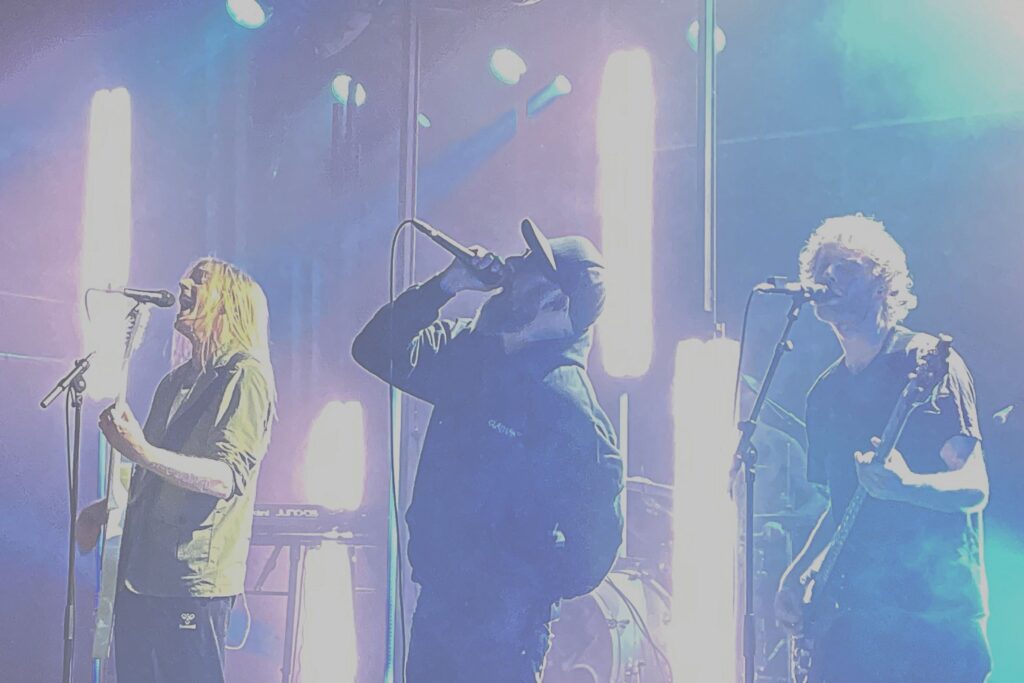
I would say that your two last records are a bit similar to each other, or are more in the same vein, and I think you took a pretty big step from the second album, Applause Of A Distant Crowd, to the third, Witness. Why did you take that step into a little bit of a different kind of music, and continued with that into Friend Of A Phantom as well?
Yeah, exactly. A bit different, yeah. So, basically, it just felt right, actually. Our second album, you know, more soft, a bit rock. That’s just kind of what we wanted at that point. It’s where inspiration took us, and it felt right. And then, for the third one, we decided that we wanted something more polished, and, you know, hi-fi. And then we started to work with Jacob Hansen. And it was just to kind of have that contrast between those albums, where we liked the sound of the second album, be we didn’t want it to be the Vola sound. We wanted it to be the second album. And then, Witness, we wanted that to be Witness, but we really, really liked working with Jacob Hansen, so that’s why we went to him again. And then there is a common thread, because album one and album two were both mixed by Asger, so they are a bit closer in terms of sound and mix, while album number three and album number four have the Jacob Hansen touch, so those became, you know, more in the same sphere. And yeah, it’s like half planned, but then also half spontaneous and in the mood. But we also didn’t want this fourth album to be, like, a Witness copy. So even though it is in the same sphere, it is a different journey. So it was important to make that kind of happen. But when you hire someone, like we do with Jacob Hansen, you have to allow them to do their thing, and they will put their stamp on it. It’s like when people hire me for drums, of course they can give directions, but still there will be my stamp on it. So there is this common thread.
Can you name one thing that you specifically wanted to come out with, drumming-wise, on this new album?
That’s a good question. (Laughs) I wanted to hit a bit harder, with two different kinds of emotions. The aggressive kind and the sad kind. I wanted to kind of make that clear in the drumming. Overall it’s less mechanic and a bit more human. Not in terms of, you know, groove, but in terms of choices. And in some places, I also wanted to make it feel like a breath of fresh air. That’s not a saying meaning that I wanted to add more fresh ideas, but really as a breath of fresh air, like it feels like there’s some wind. Especially the cymbals. Those are kind of the sounds that are in that realm of sounds. So we have a song, We Will Not Disband. Like there, you can feel there is some air in there, and I wanted the cymbals to kind of highlight that. So that’s also why I added a little bell for my drum kit for this album, which, you know, helps accentuate that on some parts. Yeah, so those kinds of soundscapes and contrasts are what I enjoyed working with on this album.
If you would talk to someone casually over dinner, and they would ask you, “What kind of music do you play?”, what would you say to that person?
So it depends. If it’s a metalhead, then I can kind of give some inclination. If it’s not a metalhead, someone who doesn’t listen to metal at all, I would just say it’s modern metal, you know. ‘Cause to someone who doesn’t listen to metal, it doesn’t matter if you mention Opeth, or if you mention Ghost, to them it’s the same. So I would just say modern metal. For someone who is in metal, I would make it quick, short, and easy, and just say Meshuggah plus Depeche Mode. That’s an easy way to kind of, you know, give a broad overview. There is of course more to it, but in general, that’s kind of how you can explain it.
But Depeche Mode is kind of broad, I think. I have just heard a little bit of it, but they started off really like a synth band, and then they went more into pop, and maybe they even went a little bit into rock music at some point.
Yeah, they have so much. That’s right. And also, something that they have is melancholy. They have a good amount of melancholy, which we have as well. You know, metal plus clean vocals, it often happens that you have, of course, you know, the kind of riffs that we have, but vocalists are very much in the high register and singing with a lot of intensity and power. While our vocalist, Asger, is more towards the Depeche Mode kind of style, in general. I’m generalizing here, but, you know, a lower kind of voice. Not a lot of screaming or pushing, but a very commanding but low and kind of soft voice in general. So that’s why I’d mention that, ‘cause it’s a bit in the same world, and then you just add Meshuggah to the mix. (Laughs)
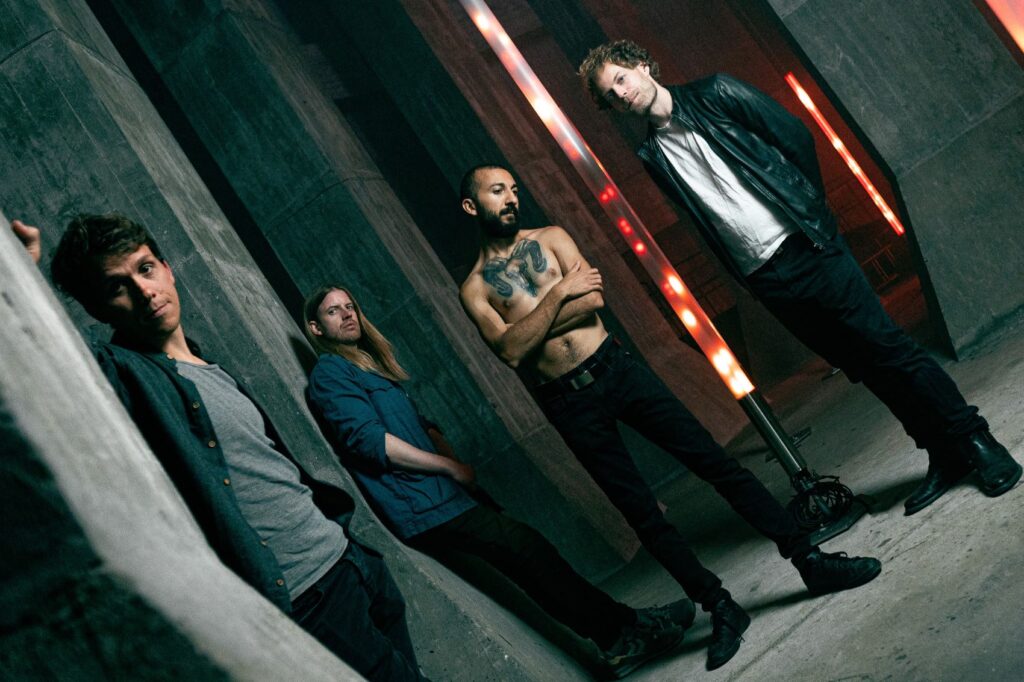
It’s four videos out now. Tell me a little bit about those videos.
So these videos: Actually we have a great team behind them. We have the people filming. It’s Riivata Visuals, from Finland, and then another big piece is the lights, so we work with Vertigo, a light company from Denmark, and we have them with us here at the shows on the full tour as well. And, you know, they custom make their lights, and they work with different installations, and stuff, so it’s very cool to have them with us. So with Riivata and Vertigo, we have a lot of fun making these videos. So, we filmed the Paper Wolf and Break My Lying Tongue videos last summer. Paper Wolf: It’s a church in Denmark, but it’s a Danish church, which means there’s a lot of, like, I don’t know, hipster paintings and some weird mannequins in the corner. It’s a church where hipsters would go. (Laughs) It’s very Danish. So we were there, but we just wanted a dark space, and the black box that we wanted wasn’t available, so. So, Paper Wolf was filmed there. At least the scenes where we play, and then Riivata filmed the story stuff on their own in Finland. Break My Lying Tongue was in a water tower not in use anymore. In Denmark as well. So we were just in the middle of that water tower, which was very cool. And then after that actually we didn’t do any videos for a long time, until this summer, where we released Break My Lying Tongue. And then it was the Cannibal video, like in a big hangar in Roskilde. So we had our cars parked in that hangar, behind the camera, and then just this light installation with lasers, and the triangle, and stuff. And Anders was there. And the day after, or the day before, we filmed the music video for Bleed Out as well, with the same team, just in a little black box room, kind of. With a screen in front of us, like a transparent screen, where they could have some projections and stuff. So very cool, but very, very demanding days, like full nights of no sleep. So that was crazy.
Some artists say that that’s very boring, but when I look at you, I don’t see boring there.
No, no, no. It’s a lot of fun. It’s really cool. Like, that’s one of the most fun parts. Like, the stuff you see in the Cannibal video. That’s not digital effects. Like, that’s how it looked like in the room. Plus we could touch the laser. You could go inside of it. It really felt like being in a sci-fi movie, or something. And for the rest, it’s the same, you know. So it’s fun. And even though it’s very late nights, and maybe a maximum of two hours of sleep, and then on to the next one, it’s still just fun. A lot of fun, yeah.
I looked at a setlist from the other day and saw that you play seven out of nine songs from the new album. Not the two last ones. That’s kind of bold, I would say, considering that the album came out pretty much the day the tour started.
We were debating that a bit before the tour, “Is it too much?”, but it just really felt right. And all of those songs, we didn’t feel like we could take out one or the other. They felt like they had a good spot in the set. So yeah, had to do it, and it has worked really well so far. They feel very good live. Yeah, it feels good to have them there. (Laughs)
What are you guys doing when you’re not on tour, not recording, and not writing music?
So me, at the moment, I’m a full-time musician, so I record the drums. Just other stuff. I play with some Swedish pop artists, like Dotter, and a guy called Rymdpojken, who writes a lot of songs with Victor Lexsell. But then I also record drums and percussion for other artists. A few years ago I did it for a video game, Metal: Hellsinger, and I did that together with a few metal vocalists. A few Swedish ones like Mikael Stanne, Dennis Lyxzén and Björn Strid. But then also some others, like Alissa from Arch Enemy, Serj Tankian from System Of A Down, and a bunch of others. So I do a lot of session stuff like that. Recording at home. And I’m doing my own kind of music as well. And the other guys have some different stuff. Our vocalist and guitarist: Now he’s kind of a dad at home and doing Vola. I think that’s what he does. (Laughs) Our bass player teaches music. And our keyboard player is an acoustics engineer actually, so he’s the one in the band who has a real job, doing real stuff. (Laughs) So yeah, that’s kind of the life that we have. And I try to take breaks from Vola sometimes at home. Especially since I do other kinds of music, I have to keep it fresh, so it’s not just the same type of music all the time. So yeah, that’s also why I try to do some of my own music, to keep that balance. And there I sing also, and just play completely non-metal stuff, so. Yeah, that’s kind of how our lives look like outside of this.
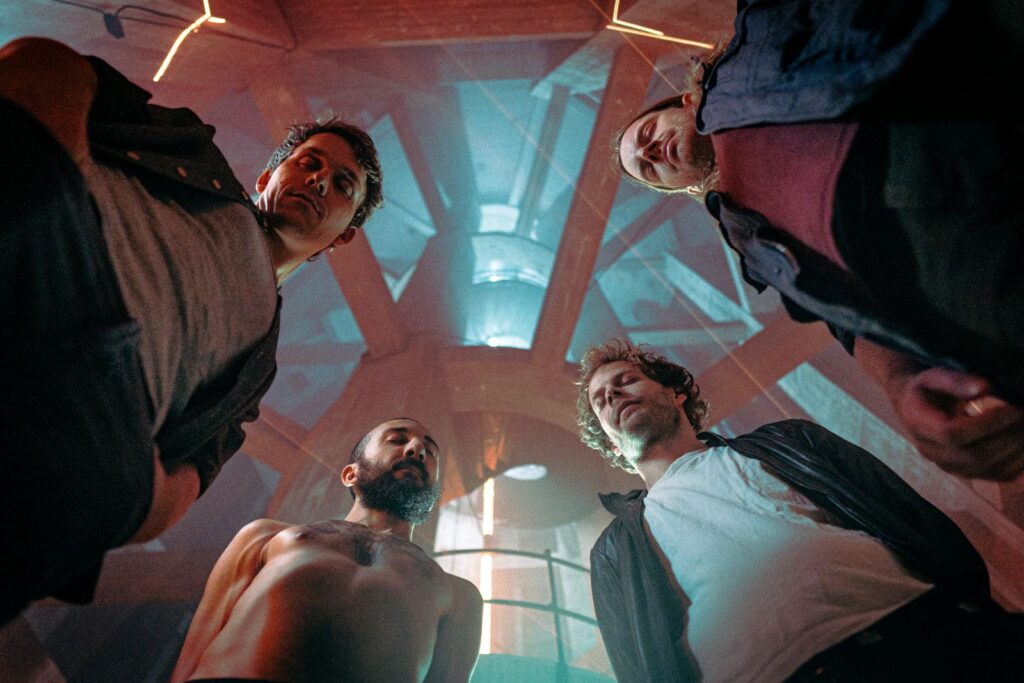
What does wearing no shirt in the photo sessions symbolize to you?
That’s just comfort. We take photos right after filming our music videos. You know, while we’re there. Everything is set up, why not take photos? So, the photographer and videographer, that we have with us on this tour as well, Heli Andrea, she usually takes the photos. She took all the photos for Friend Of A Phantom. And yeah, it’s just efficiency, and usually when I play it’s so comfy without a shirt, since I sweat so much, so. (Laughs) But of course for Cannibal, since Anders was there, I had to be proper, so I was like, “Today, I’m gonna wear a shirt.”. But yeah, it just feels good.
By Tobbe – Published November 13th, 2024
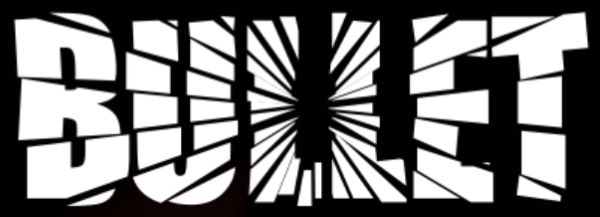
Metal Covenant tog en pratstund med Bullet-gitarristen Hampus Klang innan bandets gig i Stockholm den 1:a november.
Ni har kommit en bra bit nu med arbetet på en ny platta.
Ja, det stämmer. Jag har varit i studion nu precis. Igår kväll kom jag hem. Vi har lagt alla trummor och alla kompgitarrer. Vi har spelat in 13 låtar. Inga covers, inga intron, utan bara 13 egna låtar. Så blir det väl kanske 10 eller 11 låtar på skivan, en Japan-bonus och kanske någon singel-B-sida eller någonting sådant då. Det är inte jättestor skillnad kanske på stilen. Vår tanke var att det skulle låta piggt. Även med tunga låtar. Det får liksom aldrig låta sömnigt. Det var vad vi var ute efter liksom.
Har ni någon form av titel redan nu?
Ja, det har vi, men den vågar vi inte släppa ännu.
Även fast du typ egentligen svarat på det här redan. Kan Bullet nu under 2024 göra någonting med sitt sound som får det att låta lite annorlunda till ett skivsläpp 2025?
Nja, men alltså, vi är ju nöjda med vårt sound liksom. (Skratt) Jag tycker ju det är stor skillnad på alla våra skivor, men den som inte är så inlyssnad på oss tycker nog att det låter precis likadant. Men lite skillnad blir det ju alltid. Det har ju varit olika med låtskrivare och så, mer eller mindre på alla skivor. Men alltså, det ska ju vara gammal heavy metal liksom.
När den här nya skivan kommer ut har det gått ungefär sju år sedan Dust To Gold kom ut. Jag tycker att det är ganska länge. Vad hände? Vad har ni gjort?
Ja, det är jävligt länge. Nej, men vad fan hände? Alltså, det tar ju lång tid att göra bra låtar. Och sedan kom coronan. Vi var ju i Japan precis innan. Då var vi så jävla taggade när vi kom hem där. Äh, jag vet inte. Jag jobbade rätt mycket under Corona och det är svårt att kombinera. Man vill liksom göra en sak fullt ut. Men största problemet var väl att Alex (Lyrbo) slutade, så vi saknade en gitarrist. Och någonstans kände vi väl lite att vi vill liksom vara ett klart gäng innan vi går in i studion. Alltså, om vi ska hålla den nivån som vi haft innan och liksom någon slags helhet. Vi hade en engelsk snubbe (Ben Healey) i typ ett år, men det funkade inte riktigt med honom. Ja, sedan hittade vi Freddie (Johansson) då och sedan har vi ju gasat på. Nej, jag har inget bra svar. Det tar tid helt enkelt. Vi gör ju väldigt mycket låtar, men nästan allt skrotar vi ju. Så det hade ju gått att göra en platta snabbt, men då hade den inte blivit så bra helt enkelt. Vi vill ju vara stolta över det vi gör. Jag menar, vi har ju hållit på så länge nu. Alltså, vi har ju så mycket låtar ändå, om man tänker live, så det är roligare att lägga till några bra låtar. Men det är ju alldeles för länge tycker jag själv. Det måste jag ju erkänna.
Jag tänker att när du säger att ni hållit på länge nu, att för många så tror jag ni betraktas ändå som ett ganska nytt band.
Jamen, det är sjukt. (Skratt) Men tiderna ändras ju. Ja, det är ju helt stört att vi hållit på över 20 år. Men jag tänker mig också som att det är ganska nytt. (Skratt) Men ja, va fan, headliners på festivaler och så idag är ju 70, 80 år gamla liksom.
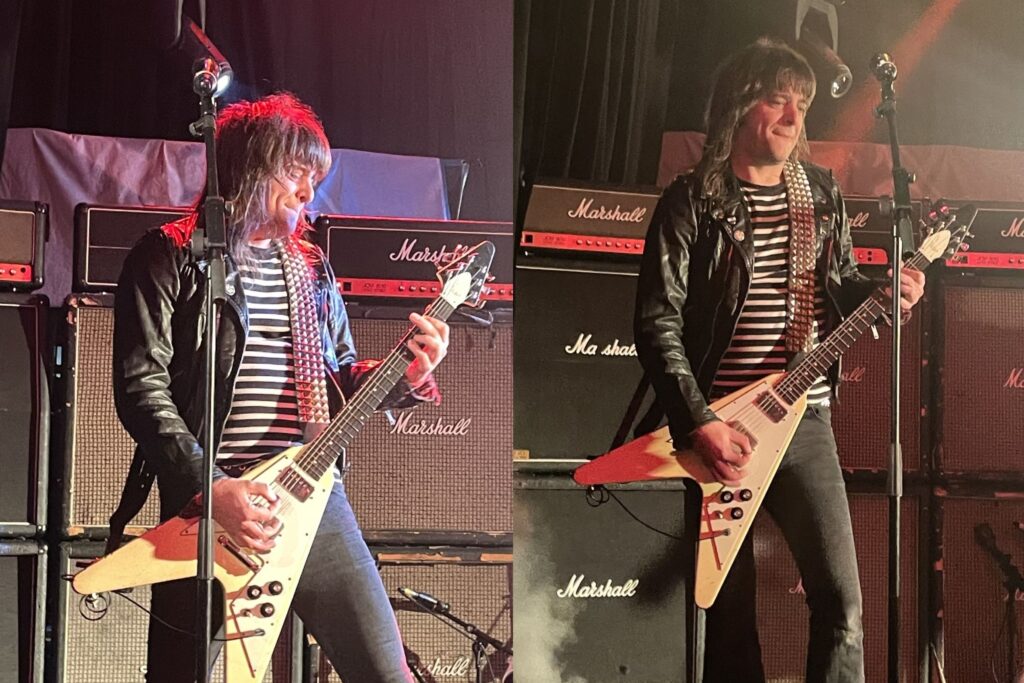
Tillbaka till plattan. Så det är inte du som spelar alla gitarrerna nu på plattan? Eller är det så?
Nej, för fan. Innan har vi varit lite så där att ibland har inte jag spelat någonting och ibland har jag spelat allt. Vi har liksom pusslat lite fram och tillbaka. Vi har inte varit så känsliga att det måste vara just så. Men på denna skiva har vi spelat alla gitarrer vänster/ höger. Man hör ju att det är två gitarrister, på gott och ont liksom. Men det vi var ute efter nu var ju att ha lite mer levande, pigg ljudbild. Ska man spela Accept-metal-låtar bara så tajt, då är det ju bättre att en person lägger det, för då blir det ju tajtare liksom, som Metallica. Och gärna samma gitarr också, så det inte låter ostämt liksom.
Har du frågat dig någon gång under det senaste året om det verkligen är värt slitet att göra en ny platta?
Ja, det tycker jag. Det är ju sjukt jobbigt. Det är en ångestprocess, totalt, att göra det. Men det är ju jävligt roligt tycker jag när man ser tillbaka på sitt liv, så här ”Vad gjorde jag det året?” och så vet man liksom att det är det, än om man hade jobbat på en fabrik och tittat bakåt. Ja, du hade väl kanske haft några tusenlappar mer på kontot, och bara dött inombords, typ. Lite så. (Skratt) Så det är ju jävligt roligt att kunna skapa någonting liksom. Det är det ju. Och dessutom när folk från hela världen gillar det. Det är inte så många andra jobb man kan jämföra det med. Eller så där att man bara kan mejla någon i nästan vilket land som helst och så kan man åka hem och bo hos dem, bara för att de gillar skivan typ. (Skratt) Så går det ju inte om man är snickare liksom.
Hur ser du på återväxten inom hårdrock och heavy metal nu när de äldre banden faktiskt börjar försvinna?
Nja, det är inte så jävla mycket faktiskt. Tyvärr är det ju inte det, om man ska vara ärlig. Jag hoppas det kommer mer. Men många vill ju ha liksom sådant som de känner igen. Gamla, hederliga band liksom. Äh, det är väl bara att hoppas på det. Nämen, det tråkiga är ju att ofta är ju bandnamnet värt mer än personerna som spelar, har man ju förstått liksom. Det är ju lite så.
Ni har ju snuddat på större framgång. Känns det lite frustrerande ibland att inte få det där liksom större lyftet?
Jo, det är klart. Visst fasen är det så. Alltså, det är ju liksom hur du ska driva ett band. Det är ju också lite lurigt. Typ förr i tiden, när vi turnerade som mest, då var det ju omöjligt att ha något jobb eller så. Samtidigt så levde vi ju billigt liksom. Men hälften av oss har något annat litet jobb så här och då blir det ju värre om man ska pussla med livet. Så det är klart, det hade ju varit kul om vi kunde smälla till lite mer. Man får väl hoppas att nya plattan hjälper lite på traven.
Har ni kanske varit för mycket rejäl och traditionell hårdrock för att hamna riktigt i ett lite mer mainstream-fack?
Ja, men har du rå sång, så. Visst, alltså, det är väl ganska lättlyssnat ändå. Vi kan ju spela för en rätt bred publik. Va fan, vi har ju varit på radio också, men man sållar ju bort en del när man har rivig sång liksom. Så är det ju. Men det är ju samtidigt det som jag gillar. Blir det för snällt… Äh, du måste låta rått. Det får inte låta snällt.
Kan man tappa drömmen ibland om att bli stor? Eller finns det alltid en tanke när man ligger där inför natten och ska sova?
Alltså, jag vet inte. Men det är klart, de största spelningarna är ju roligast. När det går att använda liksom full ljusshow och pyro och allting. Det är ju mycket roligare än att spela på en liten klubb. Alltså, det är inte pengar eller bli stor som är drivkraften egentligen, utan det är att göra det så bra så man själv blir nöjd liksom någonstans. Självklart måste det komma lite folk och finnas någon ekonomi i det och sådär om det ska gå liksom. Alltså, att bli så här Guns N’ Roses stora, det är ju omöjligt typ, men alltså, Airbourne är ju stora och de började ju ungefär som oss. Kanske en bit efter till och med. Och det är ju ungefär samma musik och de har ju lyckats bra faktiskt. Så det är ju inte omöjligt. Det är det ju inte liksom.
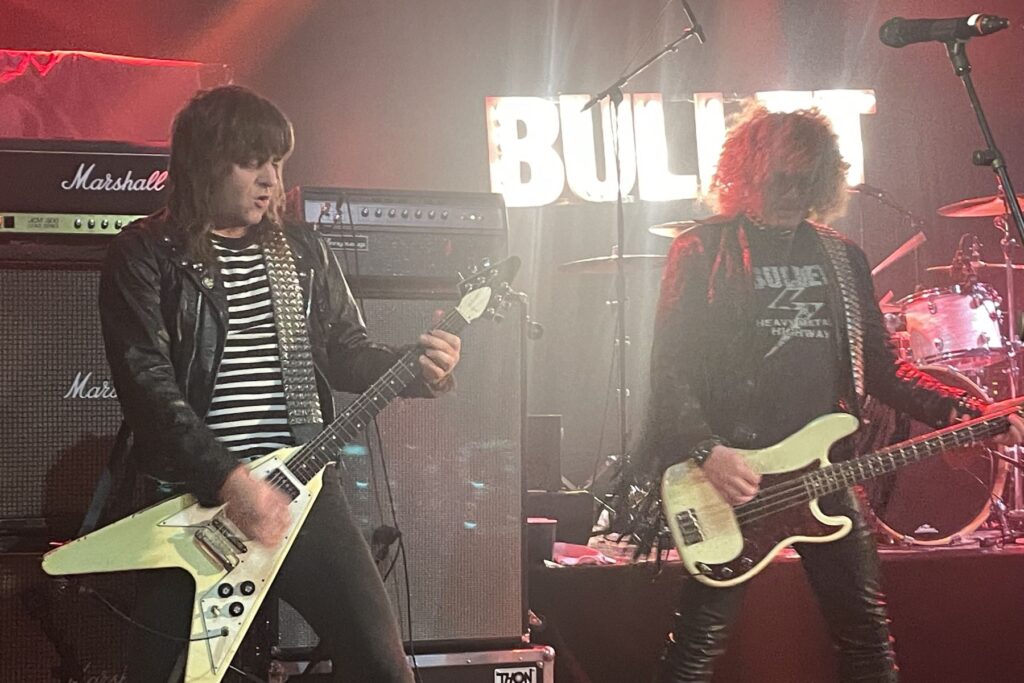
Har ni funderat på att 20-årsjubilera lite på första plattan Heading For The Top under 2026?
Nja, vi gjorde ju lite jubileum då när Erik (Almström) hoppade in. Då gjorde vi två gig med bara gamla låtar. Så det var väl nästan lite det som blev jubileum för Heading For The Top då. Så det har vi väl inte direkt funderat på något. Vi kör ju så mycket av de låtarna ändå varje kväll och så, så det är roligare att blicka framåt. Lite så känner jag faktiskt.
Men om du skulle tvingas att spela en skiva i sin helhet live, vilken skulle du då välja att spela, och varför?
Oj. Ja, det blir nog fan i mig första plattan ändå, tror jag nog. Ja, bara för att det var första skivan. Nämen, det blir ju alltid speciellt. Då har man ju rätt många år på sig där innan. Ja, vi är rätt nöjda med den också. Den kanske kunde haft en bättre produktion, men den är ju tuff som den är liksom. Men alltså, vi är nöjda med de flesta plattorna. Det är väl någon skiva som vi är lite halvnöjda med liksom. Andra plattan är ju egentligen kanske ännu bättre, Bite The Bullet. Men jag vet inte. Jag är väldigt nöjd med de två senaste skivorna också. Jag tycker de blev skitbra.
När du säger att ni hade mer tid på er inför första plattan, kommer du ihåg vad känslan var i dig och bandet för 20 år sedan ungefär?
Det var på ett sätt enklare då, för vi kan ju inte återanvända allt liksom. (Skratt) Så det var en väldigt oskuldsfull och rolig tid, med att allt gick så fort. Det hände verkligen mycket. Nä, jag kan nästan skratta ibland när jag hittar gamla papper när jag sitter och gör texter. Så här när man skriver bara stödord. Alltså hittar på bara tramsord. Och så bara kollar man på något nu, så är det typ exakt samma. Det är ingen större skillnad liksom. (Skratt) Vilken utveckling. (Sarkasm)
Apropå utveckling. Hur känner du då att ditt gitarrspel har utvecklats från första plattan till idag?
Ja du, jag vete fan om det har utvecklats överhuvudtaget. (Skratt) Men alltså, man är väl kanske lite bättre på just låtskriveri och uppbyggnad och liksom helheten idag, skulle jag nog säga. Han vi spelar in med nu är jävligt bra. I början var vi så att det skulle vara typ helt odistat, eller väldigt lite dist på solon och så. Det blir rätt mycket svårare att spela. Men nu har vi ju hittat en jävla boost på solot där, så då kan man ju spela vad som helst sedan helt plötsligt. Men solon är ju liksom det sista man gör på en skiva, tycker jag. Jag älskar ju gitarrsolon, men jag jobbar ju mest med liksom få ihop låtar och det. Det är det som är det viktiga liksom. Så jag är inte så där gitarrist gitarrist. Det var mer när man var yngre som man satt och spelade hela dagen och skulle lära sig tuffa gitarrsolon och så där. Nu har jag ju mest respekt för de gitarrhjältarna som kan göra låtar. Det är dem jag tycker är bra. Alltså, det finns ju mycket virtuoser som kan spela solo bra liksom. På YouTube är det ju de som spelar snabbare med benen typ än vad jag gör liksom.
Du var med i TV-programmet På riktigt?! och dokumentären Party Queens förra året, så du har gjort typ lite TV och så. Har du funderat på att göra något mer om tillfälle ges?
Nja. Jag försöker ju hålla mig lite borta från för mycket sådant. Men när jag fick spela AC/DC i TV där; det kunde jag ju inte tacka nej till liksom. Men, ja, det hade ju varit kul, om det är någon tuff film man får hoppa in i. Nej, jag vet inte. (Skratt) Men visst, det hade varit roligt. Absolut. Vi får se vad som kommer.
Hur ser det ut med Muskelrock framöver?
Det ser bra ut. Jag får inte gå ut med det än så här officiellt, men en barndomsidol, en stor idol, kommer komma. Det har Jacob (Hector) berättat för mig. Ja, det är ju årets höjdpunkt. Lite så. Det är en extremt rolig festival.
Och prognosen ser bra ut för ytterligare kommande år?
Ja, ja. Det är en stabil skara fans. Ja, det har hållit på många år det med nu. De går fort, åren.
Av Tobbe – Publicerad 5:e november 2024